




METRO’s Star Vanpool is the time and money-saving alternative to driving. Instead of wasting the day in rush hour traffic, improve your commute by traveling on our region’s HOV network, while avoiding traffic and promoting cleaner air. Star Vanpools reduce vehicle miles traveled in the Houston region by 48 million miles per year.
Passengers can text, listen to music, sleep, or just enjoy time to focus on the day ahead when they are not participating as the driver.

Ranked as one of the top five vanpools in the country, METRO Star Vanpool programs serve not only Harris County, but Brazoria, Chambers, Fort Bend, Galveston, Liberty, Montgomery and Waller Counties.
Registered riders are eligible for a guaranteed ride home in case of emergency. For information on how to start or join a vanpool, email us at Star@RideMETRO.org, call 713-224-RIDE (7433). $
ATTENTION EMPLOYERS! Encouraging your employees to share a ride will help them arrive on time, reduce their drive-time stress, and ease congestion on the road and in your company’s parking lot. There are also tax benefits to you and your employee when you share the cost of the ride. Launching your company’s program is free and easy. Just contact us at 713-244-RIDE (7433) or Star@RideMETRO.org, and we’ll take it from there.
ATTENTION EMPLOYEES! On average, it will cost you $4 to $10 per day to ride in a METRO Star Vanpool (even less if your employer provides a transportation benefit). This estimate is based on the number of miles from the Star Vanpool meeting place to your work site and includes van lease, liability insurance, 24/7 roadside assistance, routine maintenance and repairs, gasoline, parking and toll costs.
Riders (usually 5 to 15 per vanpool) share the cost of the van, fuel, maintenance, parking and tolls. Employers often help defray these costs.
A dedicated METRO Star Vanpool team works directly with riders to design a route tailored to their commute, using HOV and diamond lanes to reduce travel times, and to help commuters find others interested in the program. METRO also works with employers to promote and support Star Vanpool routes.

Learn more at StarVanpool.com, send an email to Star@RideMETRO.org or call 713-224-RIDE (7433).

At METRO, our mission is to provide the people of our region with safe, clean, reliable, accessible and friendly public transportation services. And as a METRO RideSponsor, you’ll have the power to supercharge your company’s benefits, by offering employees a superior daily commute. Your staff will save time on the road, money on parking and begin their day with less stress.
Providing transit benefits to your employees can help you attract and retain top talent, and using the METRO Q® Fare Card means you pay only for the transit trips used!
Who is eligible?
• Private employers
• Non-profits
• Public agencies
• Federal government agencies
• Educational institutions

No capital investment is required to become a METRO Corporate RideSponsor. You choose your subsidy allocation, and the subscription process is automated. A METRO representative will train your company administrator and is always available to assist and answer questions.
Employers can offer employees the option of exchanging up to $270 per month in taxable salary for a tax-free transit or vanpool benefit.
Employers can allocate up to $270 per month for employees to commute using public transit or vanpool for a tax-free transit benefit for employees.
Both employer-paid and employee-paid benefits are exempt from payroll taxes. So, everyone saves!
“I work in Downtown Houston, and I have been a METRO rider for more than 18 years. I started riding METRO within a year after moving to Houston and experiencing the daunting rush hour traffic and excessive amount of time it took to get into and out of Downtown. Riding METRO allows me the opportunity to read, relax, and nap if needed while someone else does the driving. The buses are clean, comfortable, reliable and it is a tremendous savings because my company supplements 100% of the cost.”
-Weldon G.“I ride the METRORail each day to work in the Texas Medical Center. I park my car a few miles away and then take the METRORail to work because it’s easy and convenient. I do not have to deal with the hassle of traffic or finding a parking space. I appreciate the METRO services!” -Gilan K.
METRO offers its riders two programs, which provide a way home in the event of an emergency or if no METRO service is available. Both programs are FREE to registered riders and designed to get them home safely. Join METRO’s RideSponsor Program today!
Learn more about becoming a METRO RideSponsor by emailing Client.Services@RideMETRO.org or call (713) 739-4015.



The Woodlands, located just 27 miles north of Houston, is one of the best-selling, master planned communities in Texas and the nation. Established 50 years ago by a visionary, George Mitchell, we’ve gone beyond just the live-work-play fundamentals to layer in environmental preservation and social consciousness, evident by the forest paths that line our homes and businesses.


The Woodlands brings the right mix of talent, commerce, and culture to companies who wish to expand their operations in an innovative and vibrant community.
Whether you’re looking to establish your corporate headquarters or your small start up, The Woodlands Area Economic Development Partnership is here to help you find your path in the forest.



our economic development partners.

We hail from every part of the country and every corner of the world. We embrace a dynamic array of cultures, cuisines and customs, weaving them into Houston’s social fabric and global outlook.
It’s this global convergence of people, industries and perspectives that gives Houston our competitive edge. Over the last two decades, there has been a remarkable transformation in Houston. Today, the nation’s fourth-largest city has become a sophisticated, modern global metro filled with talented people who have an undeniable spirit. While our shared roots are proudly planted in Texas, Houston’s reach and influence is truly global.
There’s a reason Houston is called the city of the future. In 2050, all of America is projected to look like Houston today — ethnically, racially and globally diverse. One in four of the region’s 7.2 million residents is foreign born. Over the last decade, metro Houston added 1.2 million new residents, a 17% increase, one of the fastest rates of population growth among the nation’s largest metros.
In Houston, solving the problems that matter most is what we do each and every day. From groundbreaking cancer treatments and medical breakthroughs to leading the energy transition and lowering the world’s carbon footprint — in Houston, we’re not afraid to roll up our sleeves to get the job done.
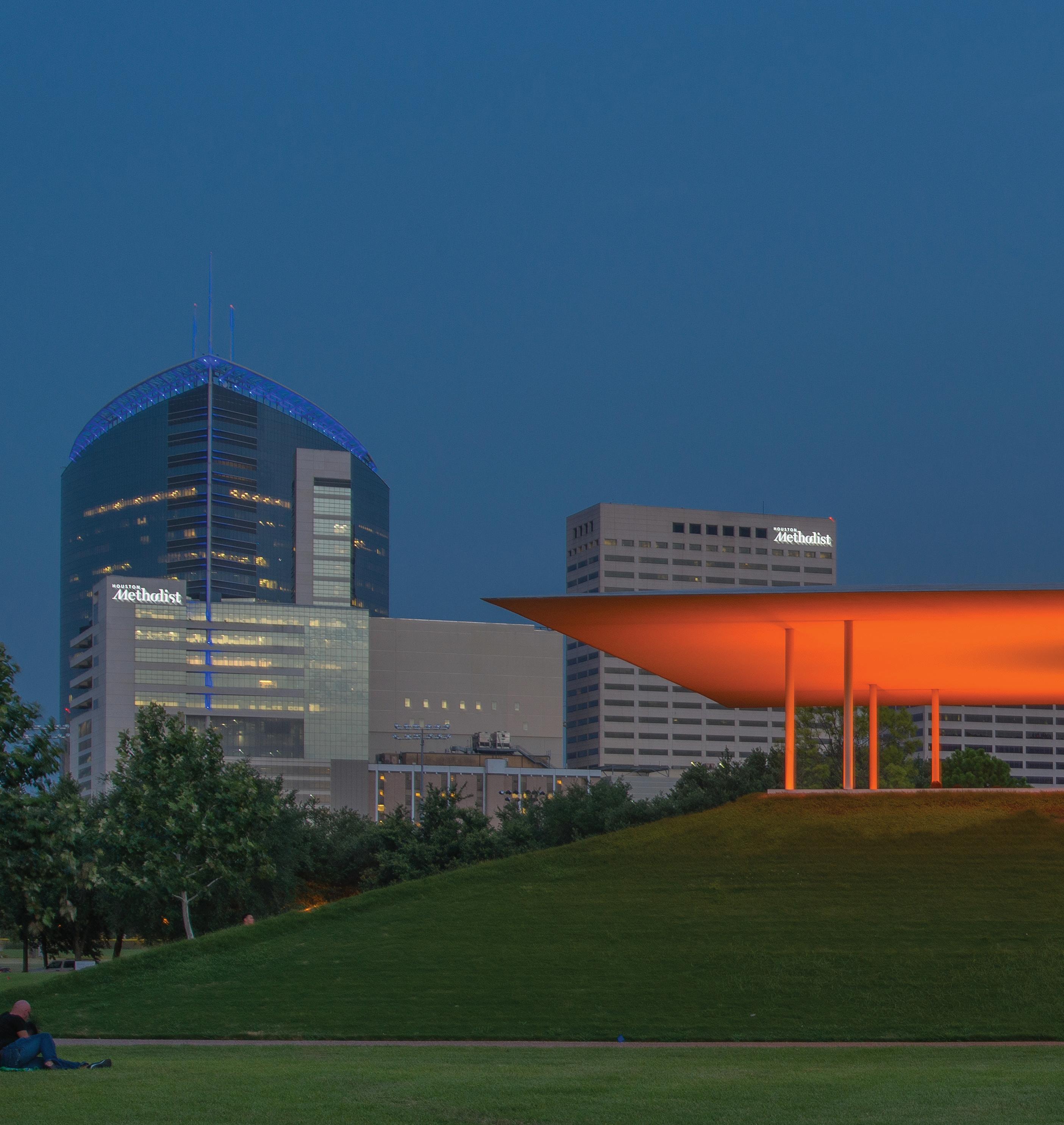
Houston offers a well-developed suite of key global industries – energy, life sciences, manufacturing, logistics and aerospace. As these industries digitize, Houston is becoming a hotbed of rapid technological development thanks to our access to customers and expertise.
A thriving global city, Houston’s ties stretch to all corners of the world. The region’s geographic location makes it easy to move both goods and people and offers the most convenient access to Latin America of any major U.S. city. With one of the largest ports in the country and two international airports, Houston connects companies to the world.
We are pro-growth and opportunity-rich, with a distinctly business-friendly environment at both the state and local level. Costs of doing business are significantly lower than in other major metropolitan areas, and the State of Texas has one of the lowest tax burdens in the nation.
Houstonians enjoy one of the lowest costs of living among major U.S. cities, while maintaining an incredibly high quality of life with world-class culture, sports and culinary attractions.
Simply put, Houston offers it all: a world class business environment, exceptional talent, low costs of doing business and global connections. Diverse people, cultures and experiences – the world, all in one place.
Houston is truly global.

Source: U.S. Census Bureau

With a regional gross domestic product (GDP) of $455.2 billion, Houston is the nation’s seventh-largest metro economy and has grown significantly by nearly 100 billion (inflation-adjusted) over the past decade. If the MSA were an independent nation, it would rank as the world’s 27th-largest economy.
Over the past decade, the Houston region has demonstrated remarkable growth and resilience.
1.2 million new residents
500,000+ jobs created
Nearly $100 billion increase in GDP
The Perryman Group notes that by the end of the next decade, the region’s:
population will hit 8.4 million payroll employment will reach 4.0 million GDP will top $1.0 trillion
H-E-B
Houston Methodist
Memorial Hermann Health System
UT MD Anderson Cancer Center
Walmart
AT&T
Baker Hughes, a GE Company
Baylor College of Medicine
BP America
Chevron
CHI St. Luke's Health
Dow Chemical Co.
Harris Health System
Home Depot
Houston Community College
JPMorgan Chase KBR
Academy Sports & Outdoors
Air Liquide USA
American National Insurance Co
Apache
Ascend Performance Materials
Bank of America
Bechtel Corporation
Ben Taub Hospital
Brinker International
Cameron, a Schlumberger Company
CenterPoint Energy
Chevron Phillips Chemical Co.
Comcast
ConocoPhillips
CVS Health
Daikin/Goodman
Deloitte
Enterprise Products Partners
Fiesta Mart
Fluor Corp.
The Friedkin Group, Inc.
Goodwill Industries of Houston
Grocers Supply Company
Group 1 Automotive
Halliburton
Hewlett Packard Enterprise
ExxonMobil
HCA Houston Healthcare
Kroger
Landry’s
Lone Star College
Michael E. DeBakey VA Medical Center
National Oilwell Varco
Occidental Petroleum
S&B Engineers and Constructors
Schlumberger
Shell Oil Co.
Texas Children's Hospital
Target Corp.
Texas A&M
United Airlines
UT Health Science Center
Wood Group
University of Houston
UT Medical Branch Health System
Walgreens
HP Inc.
Jacobs
KBR
Kelsey-Seybold Clinic
Kinder Morgan
Lewis Food Town Inc.
Lowe’s Cos.
Luby’s*
LyondellBasell
Macy’s
Marathon Oil Corp.
NASA - Johnson Space Center
Phillips 66
Note: This list reflects 2019 and does not account for increased employment or layo s due to the coronavirus.
The list excludes government employers (except hospitals, universities and research centers) and fast food chains.
*Luby’s local employment numbers for 2019. The company liquidated in August 2020.
Source: Greater Houston Partnership Research, 2020
Rice University
Sam Houston State University
Sam’s Club
San Jacinto Community College
Sysco Corp.
TechnipFMC
Texas Home Health
Turner Industries
Universal Plant Services
Wells Fargo

The Greater Houston region is one of the most dynamic in the country, featuring a variety of distinct and diverse communities to establish your business and call home. From the bustling urban core to master-planned suburban neighborhoods, Houston offers something for everyone.
The Greater Houston Partnership is proud to represent the following 12 counties:
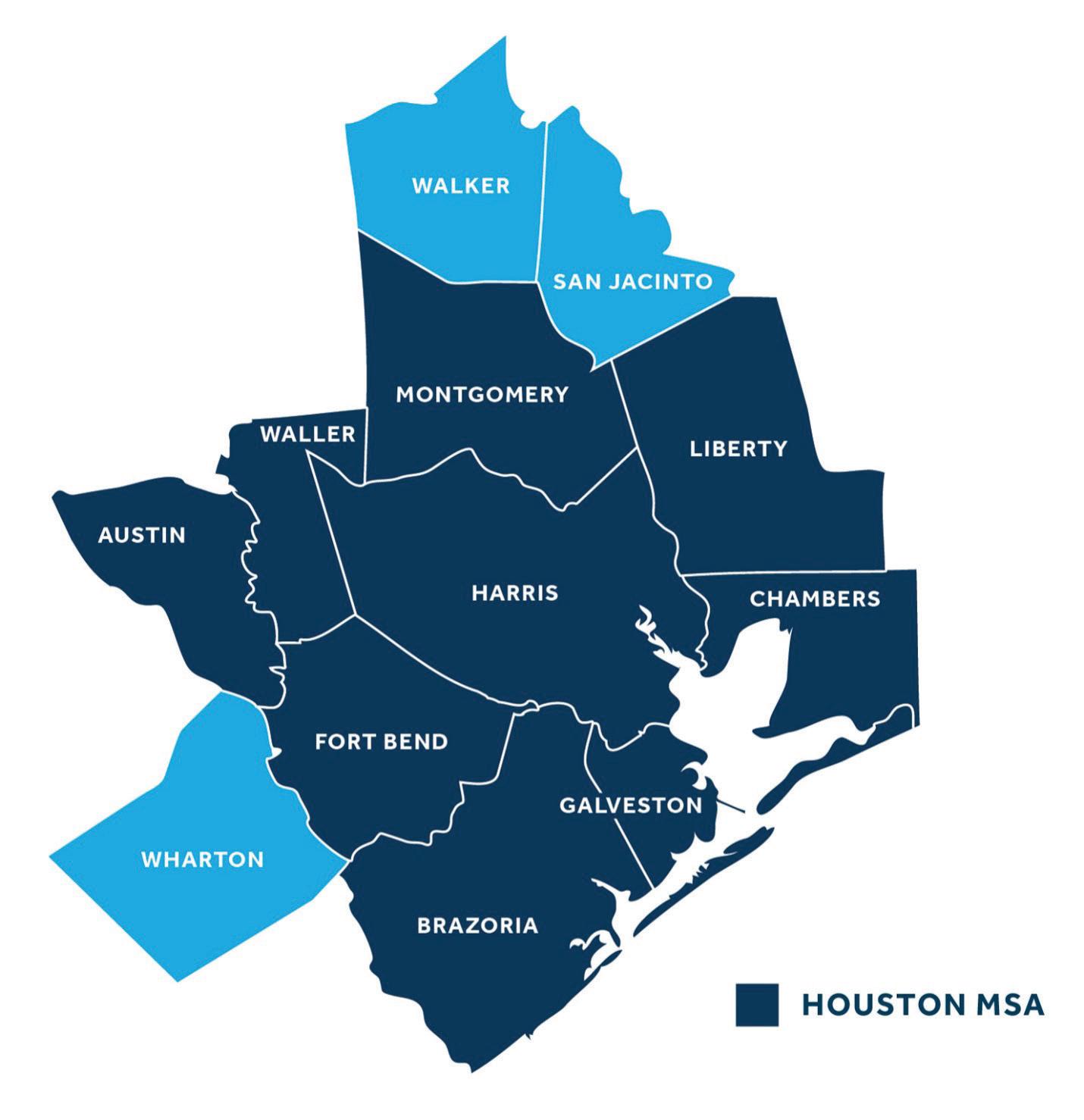



Texas Southern University Proud graduates from one of nine Houston-area universities
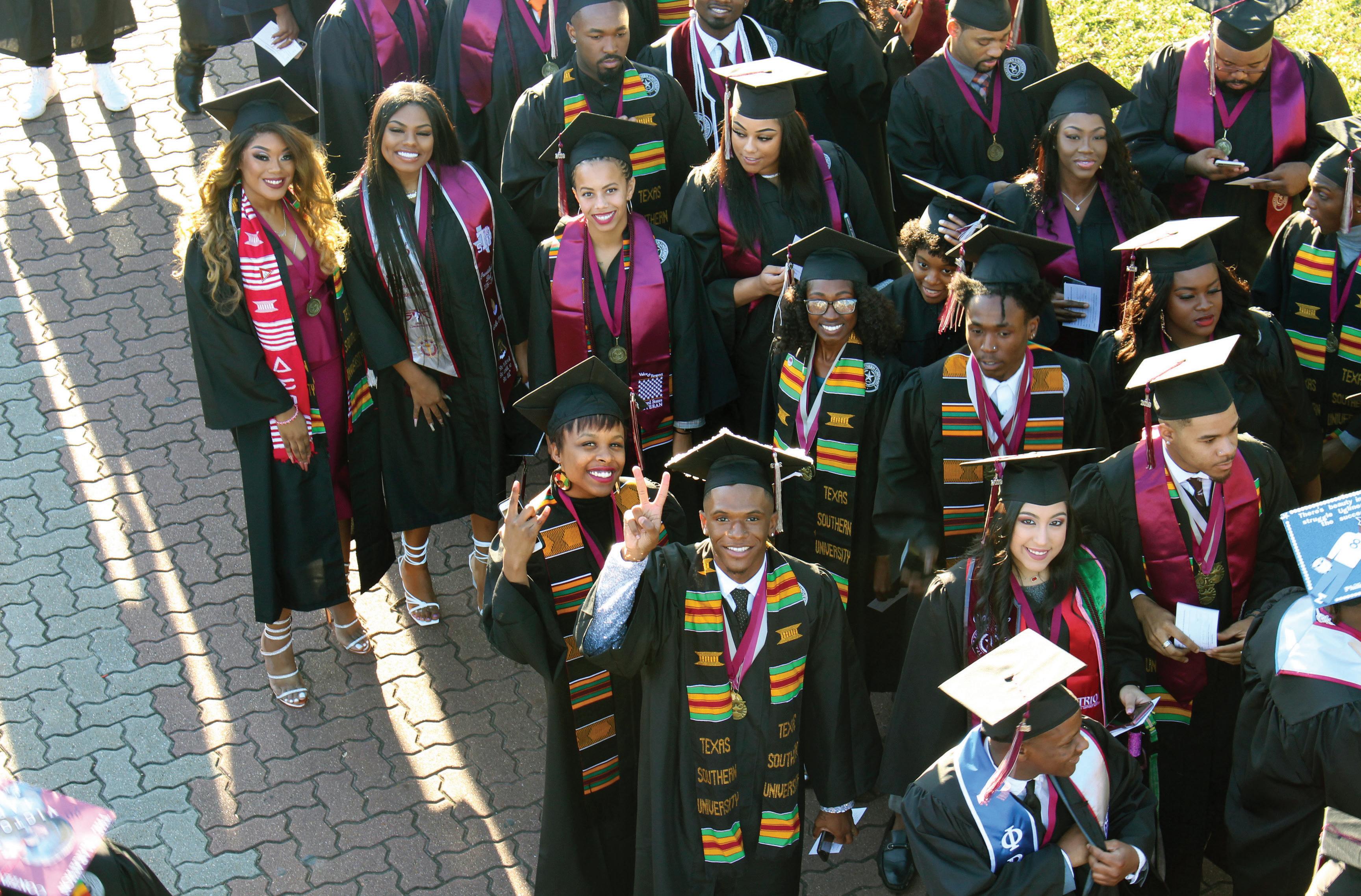
The Houston metro area is the most racially and ethnically diverse region in the United States, and the fourth most populous with 7.3 million people. The region offers a large and highly skilled labor force of more than 3 million workers, larger than that of 35 states.
Houston is home to more than 1.1 million millennials (adults between the ages of 24 and 35). The number of young adults in that age group has grown 25 percent in the last decade. Houston’s millennial population continues to grow; the city is among the top 10 in the U.S. for attracting millennials and retaining college graduates.
300,000+ educated millennials
52,000 engineers
243,000+ tech professionals
700,000+ corporate professionals
The Houston region has more than 40 two-year community colleges and four-year universities, including three Tier 1 Universities: Rice University, University of Houston and nearby Texas A&M University in College Station. Houston-area colleges and universities educate more than 417,000 students and graduate nearly 100,000 students annually.
The region also has 50 trade, vocational and business schools specializing in law, health care, welding, process technology and various other disciples that enroll an additional 20,000 students, according to the National Center for Education Statistics.
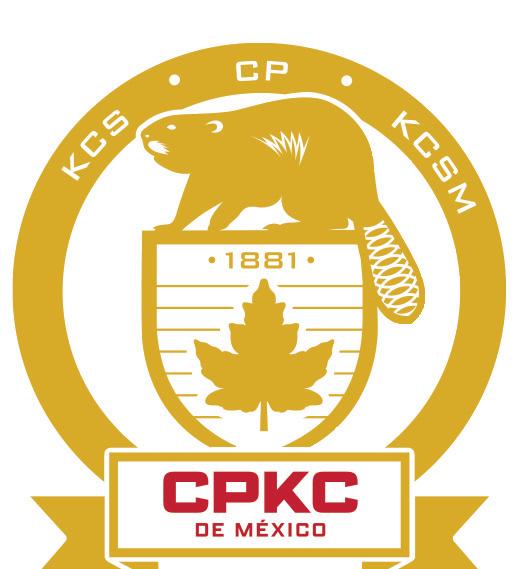





Houston’s international roots run deeper than our regional economy. In fact, the New York Times and Los Angeles Times have declared Houston “America’s Most Diverse City.” Houston has no ethnic majority and welcomes people from around the world. In terms of racial and ethnic composition, the Houston of today resembles what America will look like in 40 years.
The Houston metro area is home to an estimated 1.6 million – or one in four – foreign-born residents. These residents accounted for roughly one-third of the area’s population growth over the last
decade. Without them, the region’s GDP would be lower by 29%. More than 145 languages are spoken across Houston, and four in 10 Houstonians speak a language other than English at home.
Houstonians have a sense of shared community, commitment and mutual respect that many American cities are searching for today. People of all faiths, cultures, backgrounds and members of the LGBTQ+ community find Houston to be an inclusive and welcoming city. Houston hosts several cultural festivals and parades, including Pride Houston, Japan Festival Houston and the Greek Festival.

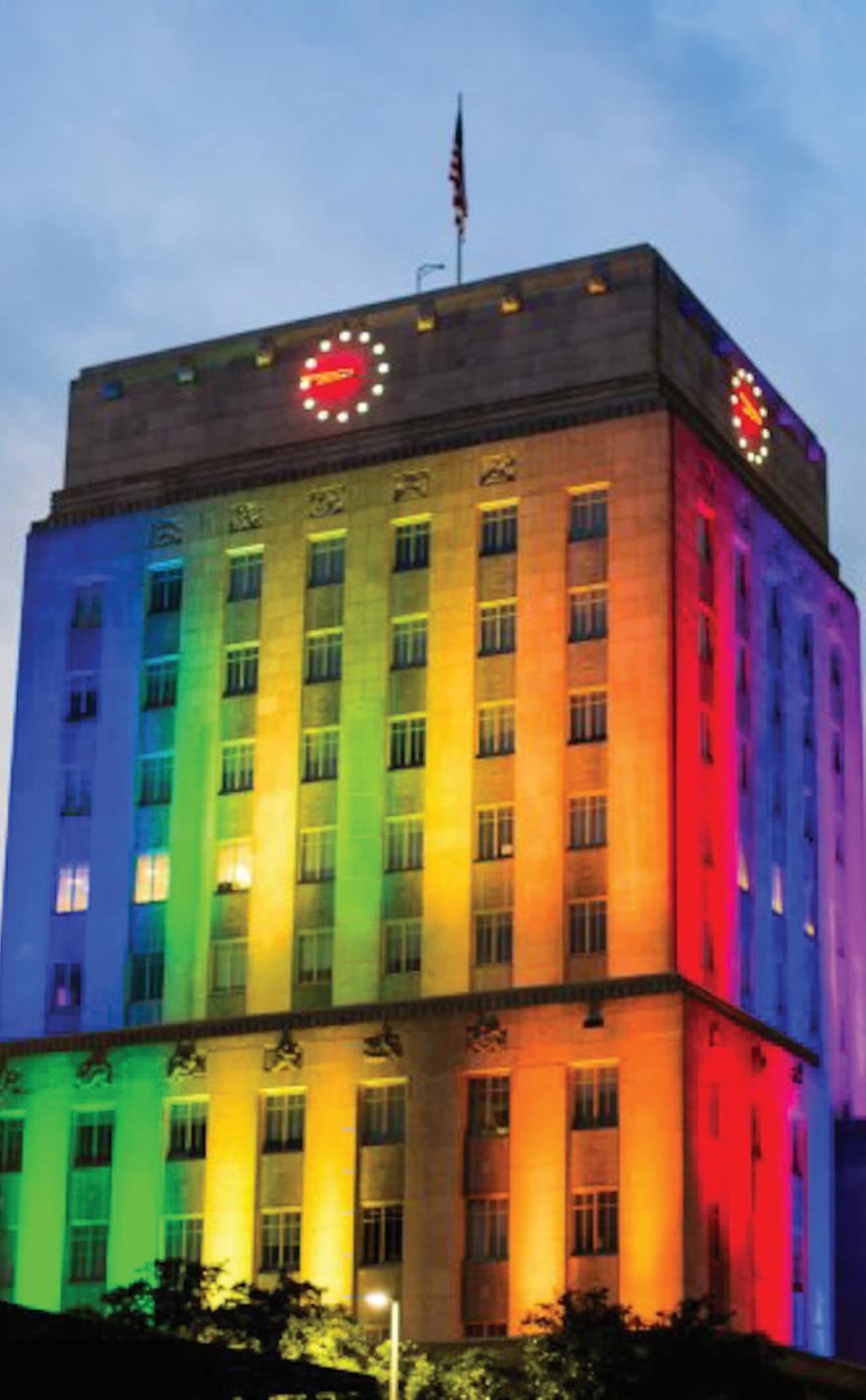





Houston is a great global city, with ties reaching around the world. The region’s geographic location provides easy access for both goods and people. From the Port of Houston and the Houston Airport System to a host of multi-national entities doing business around the clock, Houston is where you want to be to connect your business to the world.
Houston’s economy is deeply tied to global trade and foreign
Direct flights to 193 destinations around the globe and official government representation from 90+ nations, the third largest in the U.S.
145 Houston-based companies operate 3,107 foreign subsidiaries
More than 1,700 Houston companies report foreign ownership
16 foreign banks operate in Houston, representing nine nations
investment. The region has trading relationships with more than 200 countries and territories. The Houston-Galveston Customs District handled trade valued at $273.1 billion in 2021, up more than 40 percent from the previous year.
• The custom’s district ranks first in total tonnage in the nation.
• The Port of Houston ranks first in the country in total value of foreign cargo handled.
• Houston has the largest export market in the U.S.
5,000+ Houston-area firms, foreign government offices and nonprofit organizations involved in international business
15 foreign trade and commercial offices and more than 39 foreign chambers of commerce and trade associations
19 sister-city relationships promoting business opportunities across five continents


FForeign companies operating in Texas grew jobs in the Lone Star State by 21% in the five years that ended in 2019.
That’s according to a report released by the Global Business Alliance trade group that shows foreign direct investment (FDI) accounts for more than 678,000 jobs in Texas, with roughly 30% of those in the manufacturing sector. Roughly 1,820 international companies have operations in Texas and firms based in the United Kingdom, Japan and France support the largest number of FDI jobs in the state.
The 21% increase in FDI employment between 2014 and 2019 outpaced overall private sector employment in Texas, which grew by just 12% during the period. International companies account for about 6.2% of the state’s total employment, higher than the U.S. average of 5.9%, the report shows.
Nationwide, FDI supported 69% of the new manufacturing
jobs created in the five-year period. Overall FDI employment in the U.S. increased 20%, compared with a 9% increase in private sector employment. Firms from Japan, Canada, Germany, the U.K. and France lead the way in foreign direct investment in the U.S.
With two international airports and the nation’s No. 1 port by tonnage, Houston is Texas’ global gateway. Roughly 1,700 firms operating in the region report foreign ownership and more than 90 countries have a consulate or other official government representation here.
In 2023, Houston ranked first in the second annual Invest in America, rated by GIS Planning, the Financial Times, Nikkei, and FDI Intelligence. Houston was one of only two U.S. cities on the most recent list, which ranks major global cities based on foreign direct investment.
 George Bush Intercontinental Airport Travelers are greeted with a display of international goodwill.
George Bush Intercontinental Airport Travelers are greeted with a display of international goodwill.


Now is the time for commercial development in La Marque. Whether you're looking for existing retail space, prime I-45 frontage or prefer to be part of our budding downtown revitalization, the City of La Marque is business-friendly and future-focused.
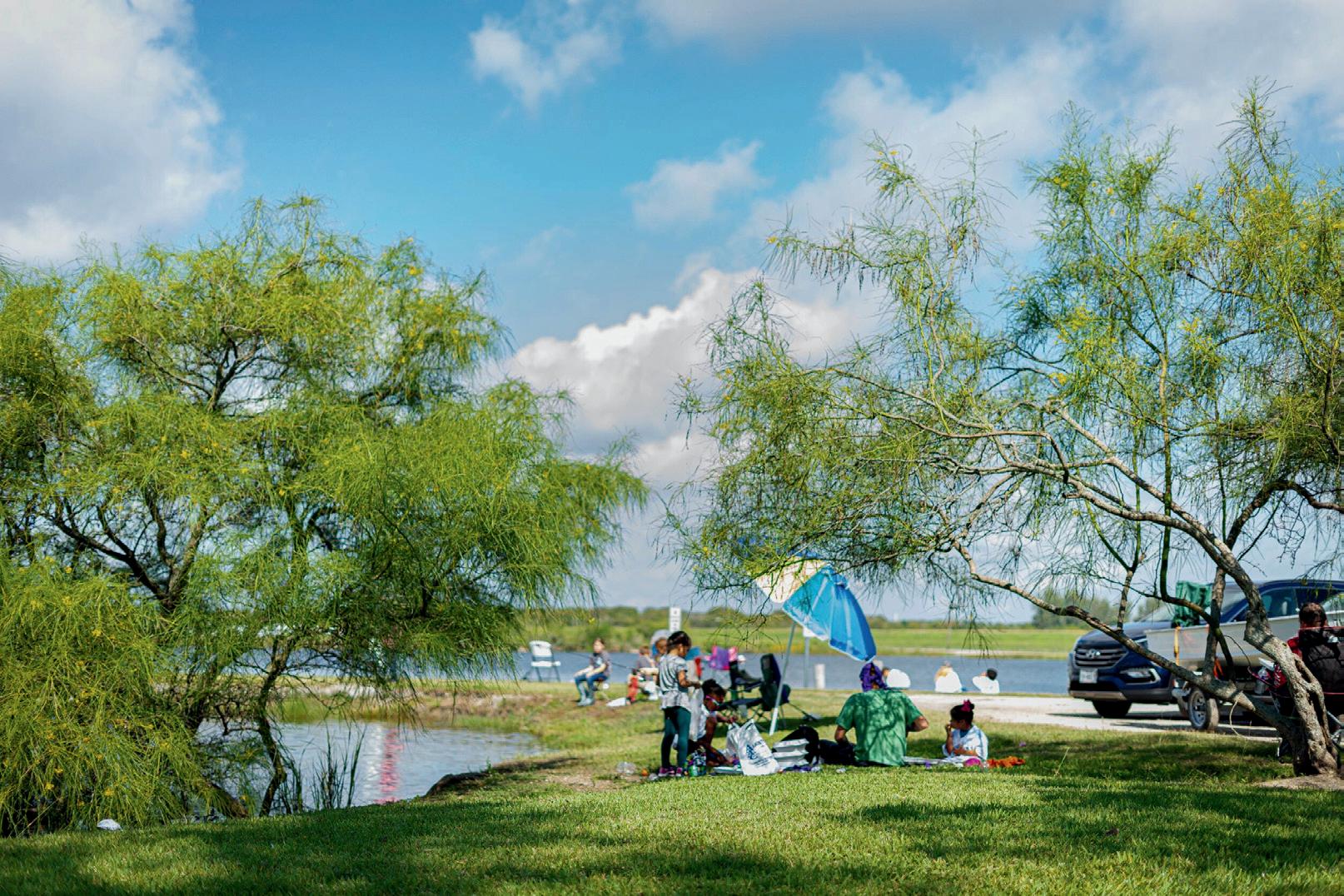
Location, location, location!
Prime location along I-45 and HWY 3 makes the city a desirable spot for development, with the kind of accessibility businesses crave.
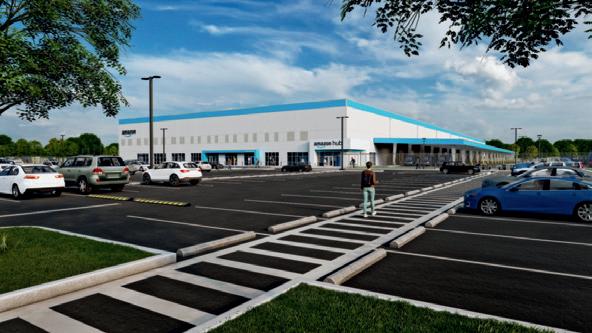

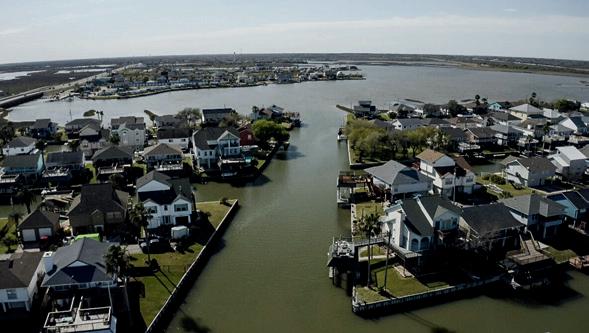

From 2010 to 2019, La Marque experienced a 31% increase in population growth, making it one of the fastest growing cities in the Houston region. HAR.com recognized La Marque as one of the Top Ten Hottest Communities near Houston.
One of La Marque's biggest draws is the available real estate and expansion opportunities, especially along the major thoroughfares.


The Houston region offers a low cost of living while maintaining an incredibly high quality of life with amenities you expect to find in a world-class city. Houstonians, no matter what age or background, enjoy countless activities and opportunities. Houston is a welcoming and global city, filled with exceptional dining, arts, hotels, sports and events. In fact, GQ magazine dubbed Houston the “Capital of Southern Cool.”
Houston’s overall living costs are 34.1% below the average of the nation’s 20 most populous metropolitan areas, ranking it the second most affordable, according to the Cost of Living Index from the Council for Community and Economic Research (C2ER). Houston’s overall living costs are 6.2% below the average for all U.S. metros.
Texas is one of the few U.S. states that does not have an
individual income tax and ranks among the best states for individual tax rates. Houston also has one of the lowest personal and per-family tax burdens among major U.S. cities. Housing costs in Houston are 36% below the average for the nation’s 20 most populous metro areas, and 8.6% below the average for all U.S. metros. Excluding the two most expensive housing markets, New York and San Francisco, which tend to skew the average, Houston’s housing costs are still 62.7% below the major metro average.
Houston offers a low cost of living while maintaining a high quality of life with the amenities expected in a world-class city.
Houston’s Texas Medical Center (TMC) is the world’s largest medical complex by number of hospitals, number of physicians, square footage and patient volume. TMC’s dozens of member institutions are consistently recognized by U.S. News and World Report as some of the best hospitals and universities in the nation. Prominent institutions include MD Anderson Cancer Center, Texas Heart Institute and Baylor College of Medicine, among other premier training, research and clinical institutions.
Houston’s large and growing footprint has led to a resurgence in urban living. The city’s signature neighborhoods, such as Downtown, EaDo, Uptown, Midtown and Montrose, offer residents access to urban living at affordable costs. Projects like the Uptown District and Avenida Houston in downtown are just a few examples of how the city continues to invest in increasingly walkable dining and entertainment districts.
Houston is a shopping mecca and home to over 8,000 retail centers. From lavish malls, like The Galleria and Memorial City, to “storefront neighborhoods,” like Post Oak, Highland Village, Uptown Park, River Oaks District and Rice Village, Houston’s shopping scene is as vibrant and diverse as the city itself.
Houston is a great place to play. You can enjoy countless activities without the premium price of other major cities.

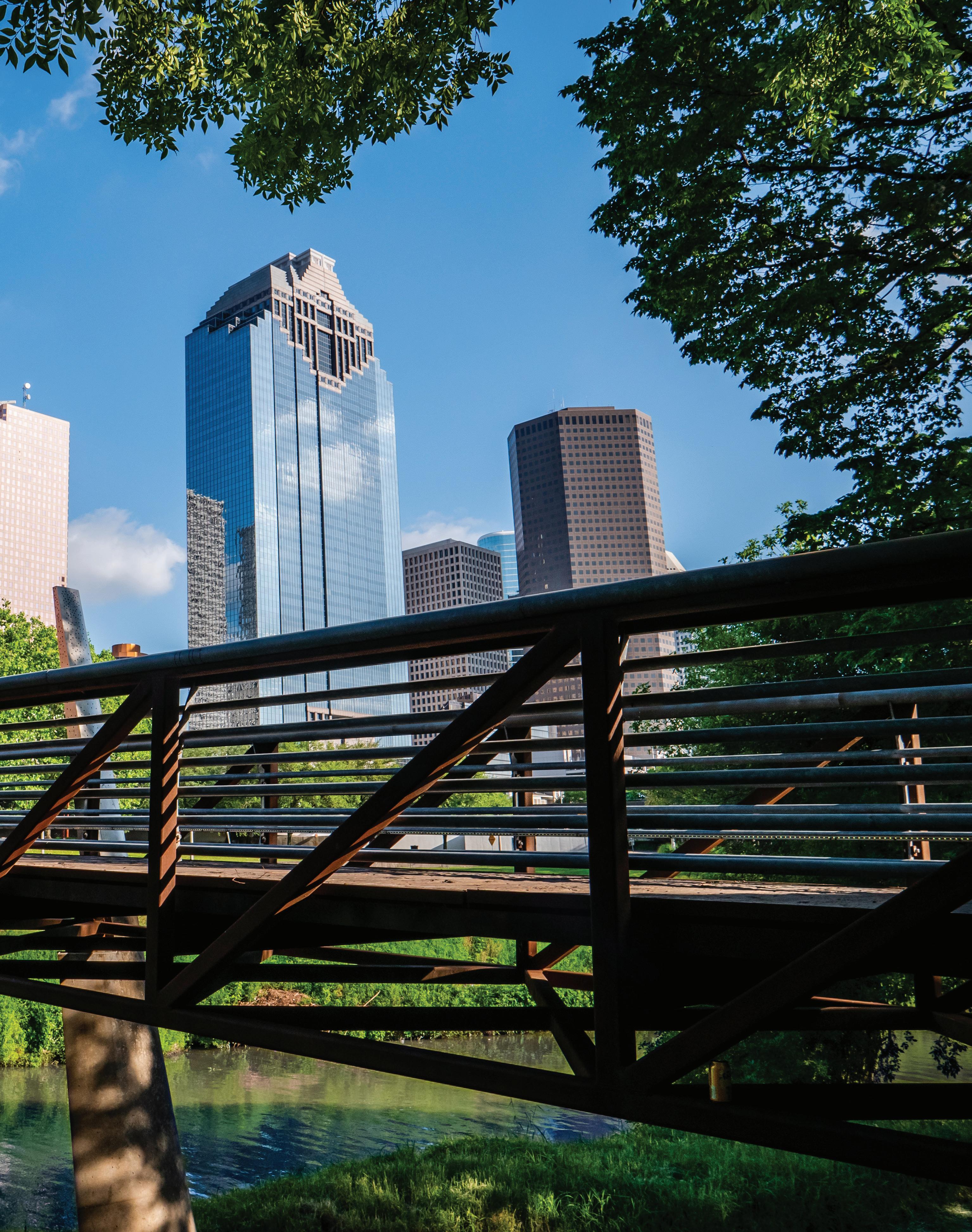
Houston is one of America’s greenest cities, ranking first in total park acreage among major U.S. metros. The region boasts 350 miles of interconnected bikeways, 380 developed city parks and 170 open spaces. In fact, Houston is home to two of the nation’s 10 largest urban public parks, Cullen Park and George Bush Park. Over the past decade, Houston has seen a nationally recognized green space renaissance. Several of the city’s signature parks, including Memorial, Hermann, Buffalo Bayou, Levy Park and Discovery Green, have implemented master plans to further expand their offerings to Houston-area residents and visitors. The Memorial Park Master Plan is one of the largest and most visionary urban parks projects currently underway in the U.S. In 2020, the Houston Botanic Garden opened on a 132-acre expanse in southeast Houston, promising to be a new outdoor centerpiece for the city.
Several years ago, the Houston Parks Board and Houston Parks and Recreation Department embarked on a $220 million project to connect 150 miles of hike-and-bike trails and parks along the city’s eight bayous. Now, an incredible 3,000 acres of unused land is being converted to public park space and 1.5 million Houstonians will soon live within 1.5 miles of the Bayou Greenways. The City of Houston has also adopted a plan aimed at drawing private investment to revitalize city parks primarily in underserved communities.

Houston is one of the few cities in the U.S. with resident companies in all four major performing arts — drama, ballet, opera and orchestra. Houston’s worldrenowned cultural scene includes more than 500 institutions devoted to the performing and visual arts, science and history. The region’s nonprofit arts and culture industry generated over $1.1 billion in total economic activity, according to the ’17 Arts & Economic Prosperity report by Americans for the Arts.
Houston’s Theater District, located in downtown Houston, spans 17 blocks, and its four flagship theaters house 13,000 seats. The Alley Theatre, Hobby Center for the Performing Arts, Jones Hall and Wortham Theater Center host seven renowned performing arts organizations as well as many smaller programs.
The Houston Museum District is one of the country’s most visited and diverse cultural centers with 19 museums. These museums provide rich experiences in art, history, culture, nature and science. The district is divided in four walkable zones, each of which includes a group of museums. Since 2018, investments in the Houston Museum District, including completed projects and some in progress, total more than $800 million.
Theater Under the Stars The cast of TUTS’ production of ‘Jerome Robbins’ Broadway’
From team sports to extreme sports, Houstonians are loyal and embody a winning spirit. Houston has played host to the nation’s — and the world’s — largest sporting events, including the Super Bowl, NCAA Finals, MLB All-Star Game, Copa America Centenario and the NBA All-Star Game. Locally, Houstonians cheer on the ’17 World Series Champion Astros at Minute Maid Park, the Rockets at Toyota Center, the Texans at NRG Stadium, the Dynamo and the Dash soccer teams at PNC Stadium and the rustlers at the Houston Livestock Show and Rodeo (the world’s largest live entertainment and livestock exhibition).
Known as the Culinary Capital of the South, Houston delivers on its reputation. Houston restaurants feature outstanding regional dishes as well as diverse international cuisine. With more than 12,000 restaurants and bars representing dozens of countries and domestic regions, Houston’s global ties are prominent across 80 different culinary categories. Houston was ranked among Wallethub’s Best Foodie Cities in America in 2021 and included in Harper’s Bazaar ’s list of “The 20 Best Places to Travel in 2020.” Houston’s reputation as a culinary hotspot was one of the reasons Bravo decided to film its 19th season of Top Chef in H-Town.
Houston’s mass transit network, METRO, serves an area of 1,303 square miles with 21 transit centers, 8,964 bus stops and 27 Park & Ride lots. Ridership in 2022, including bus, rail and Park & Ride, is expected to top 48.4 million passengers. As the city grows, METRO is actively working to improve mobility, enhance connectivity and support vibrant communities through its METRONext plan.


 Stick Your Neck Out Clockwise from top left: The Houston Zoo, Children’s Museum and Houston Arboretum & Nature Center
Stick Your Neck Out Clockwise from top left: The Houston Zoo, Children’s Museum and Houston Arboretum & Nature Center
It's a question just about every family struggles with: what can we do this weekend? Fortunately, in the nation's fourth-largest city — home to hundreds of vibrant parks, dozens of top-rated museums and five pro sports teams — residents have a lot to choose from when it comes to exploring this dynamic region. Here are five fabulous, family-friendly activities in Houston.
EXPLORE A MUSEUM For families who are seeking respite from the heat or rain, Houston has a lot of indoor options to keep kids of all ages entertained. Popular options include Children's Museum Houston, featuring hands-on galleries and a multitude of exhibits and programs for children through age 12, and the nearby Houston Museum of Natural Science, where families can view more than a dozen permanent exhibit areas showcasing space science, Native Americans and paleontology, as well as the Wortham IMAX Theatre, the Cockrell Butterfly Center and the Burke Baker Planetarium.
Parents can find several other options in and around Houston's world-renowned Museum District, including the Asia Society Texas Center, the Buffalo Soldiers National Museum and many others.
TAKE IN A PERFORMANCE Families can also head to the Theater District, which features major symphony, ballet, opera and theater companies of worldwide acclaim. Parents can find dozens of kid-friendly performances at Theatre Under the Stars (TUTS), one of the largest nonprofit producers of musical theater in the country staging Broadway classics, world premieres and new works at the Hobby Center for the Performing Arts downtown as well as the Houston Ballet, one of the best — and largest — ballet companies in the U.S.
Families can go to the moon, stars and beyond at Space Center Houston, the official visitor center of NASA's Johnson Space Center.
Located less than half a mile away from JSC in Clear Lake, Space Center Houston features educational exhibits, historical galleries and live presentations.
For a different look at the sky, families can take in stargazing at the George Observatory, the Houston Museum of Natural Science's satellite facility at Brazos Bend State Park. The observatory houses the largest telescope available for public viewing in the Houston area.
Houston's vibrant parks and green spaces play a huge role in the region's high quality of life for all residents, including families. With over 360 parks and more than 200 green spaces within the City of Houston alone, families have a variety of places to visit.
That includes Hermann Park, a 717-acre park located eight miles from downtown featuring a lake, wetlands area, a Japanese Garden, the Centennial Gardens and numerous trails and picnic spots to explore. Popular kid-friendly amenities include the nationally recognized Houston Zoo and the Hermann Park Railroad. Families can also pack a picnic and attend a show at Miller Outdoor Theatre.
Other popular park options to visit include the recently renovated, 12-acre Discovery Green near the George R. Brown Convention Center, and the 160-acre Buffalo Bayou Park, which includes family-friendly activities such as hike-and-bike trails, paddle craft and bike rentals and an underground Cistern. Work is currently underway on the Buffalo Bayou’s East Sector — encompassing the four-mile stretch from U.S. 59 to the Port of Houston Turning Basin. The plan includes 40 miles of new and improved waterfront trails and bikeways and 200 acres of parks and unique public spaces woven between public land and infrastructure.
For a fun kid-friendly weekend adventure, Houstonians can find nature trails, campsites and more at several state parks and national forests, including Brazos Bend State Park, Galveston Island State Park and Sam Houston National Forest, which covers 163,037 acres across Huntsville, Conroe, Cleveland and Richards, Texas.
CHEER ON YOUR FAVORITE TEAM Home to five pro sports teams, as well as semi-pro and collegiate teams, Houstonians can cheer on their favorites year-round. Families can take in the action at Minute Maid Park downtown to cheer on the Houston Astros from April through the fall, watch the Texans play at NRG Stadium in the fall, grab courtside seats to see the Houston Rockets at Toyota Center in the winter and spring, or head to PNC Stadium in EaDo to watch the Dynamo and Dash play throughout the year.
And for families who want to take in a major annual event featuring rodeo competitions, a carnival and more, the Houston Livestock Show & Rodeo is a family favorite.

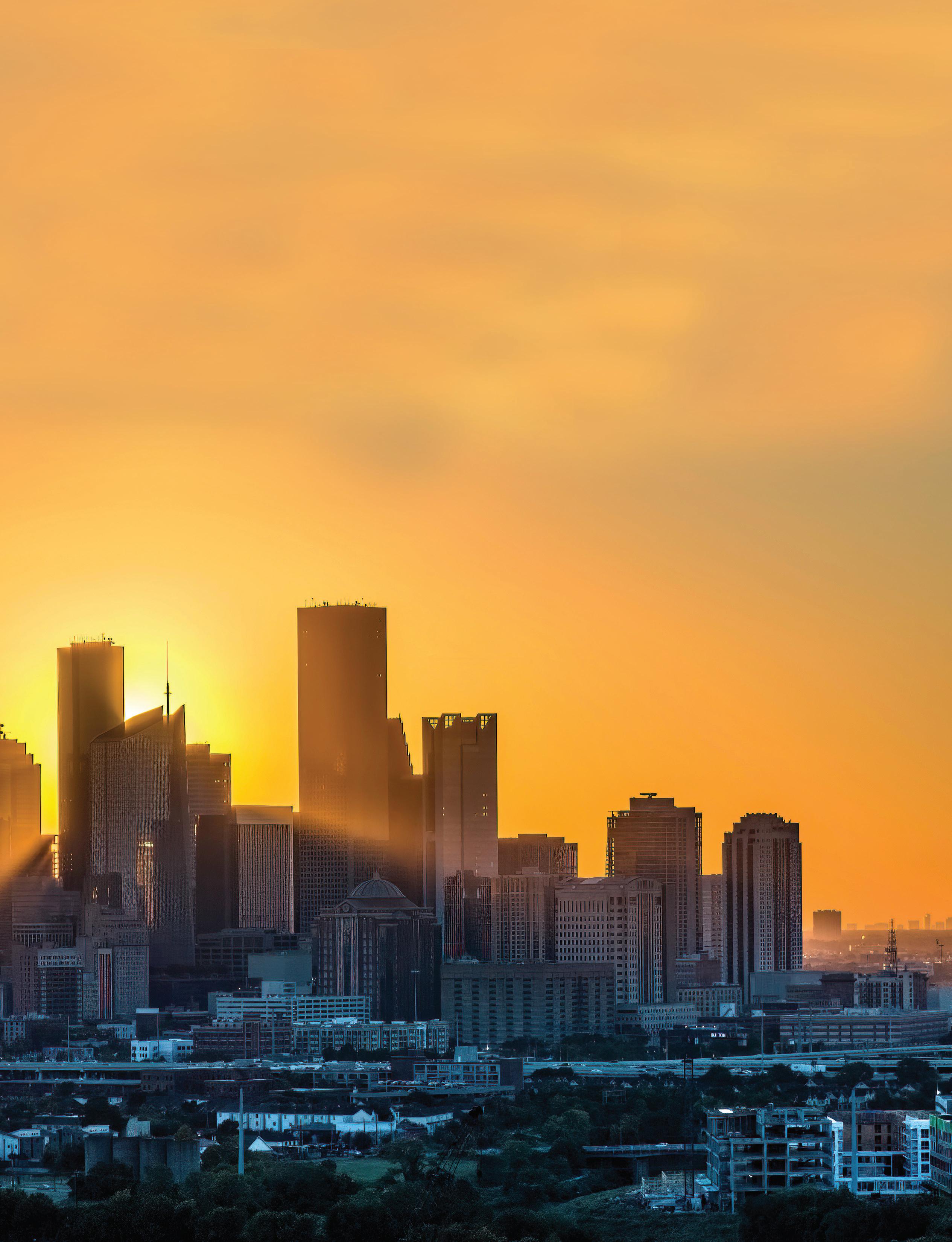
Houston’s journey from a small frontier settlement to America’s most diverse city and a top global market with a thriving business climate is a testament to its resilience and adaptability.
In recent years, the Greater Houston area has emerged as a powerhouse of innovation, fostering growth across a diverse range of industries and attracting talent and investment that has catalyzed growth in Life Sciences and Biotechnology, Tech, Energy, and Aerospace and Aviation, among others.
Houston has made impactful additions to the life sciences and biotechnology space by developing workforce programming, bolstering infrastructure and leveraging the world’s largest medical complex – the Texas Medical Center - to position itself as a growing life sciences region. The ecosystem is witnessing expansion in areas like cell and gene therapy research and development and manufacturing, cancer-focused molecular diagnostics within R&D, and numerous other areas. Houston is witnessing a burgeoning wave of life sciences advancements, fostering innovation and collaboration among industry leaders. This transformation is exemplified by recent developments, including TMC’s Helix Park that will provide 6 million square feet of research labs, retail, hotel and large-scale commercialization space. Levit Green, a 53-acre mixed-use life sciences district near the Texas Medical Center and Generation Park,
a 4,200-acre master-planned district designed to nurture a vibrant ecosystem for business growth and facilitate the convergence of education and industry.
“Over the last year, we have seen the outstanding growth in the Houston region’s life sciences ecosystem, most visibly through the development of Levit Green and TMC Helix Park,” Dr. Ferran Prat, Senior VP, Research Administration and Industry Relations, MD Anderson Cancer Center, said. “Such spaces afford MD Anderson and other major players an in-town, world class hotbed of innovation and commercialization.”
Houston’s high concentrations of life sciences employment, healthy funding landscape and commitment to translational research is bolstering its position as one of the country’s fastest growing life sciences ecosystems.
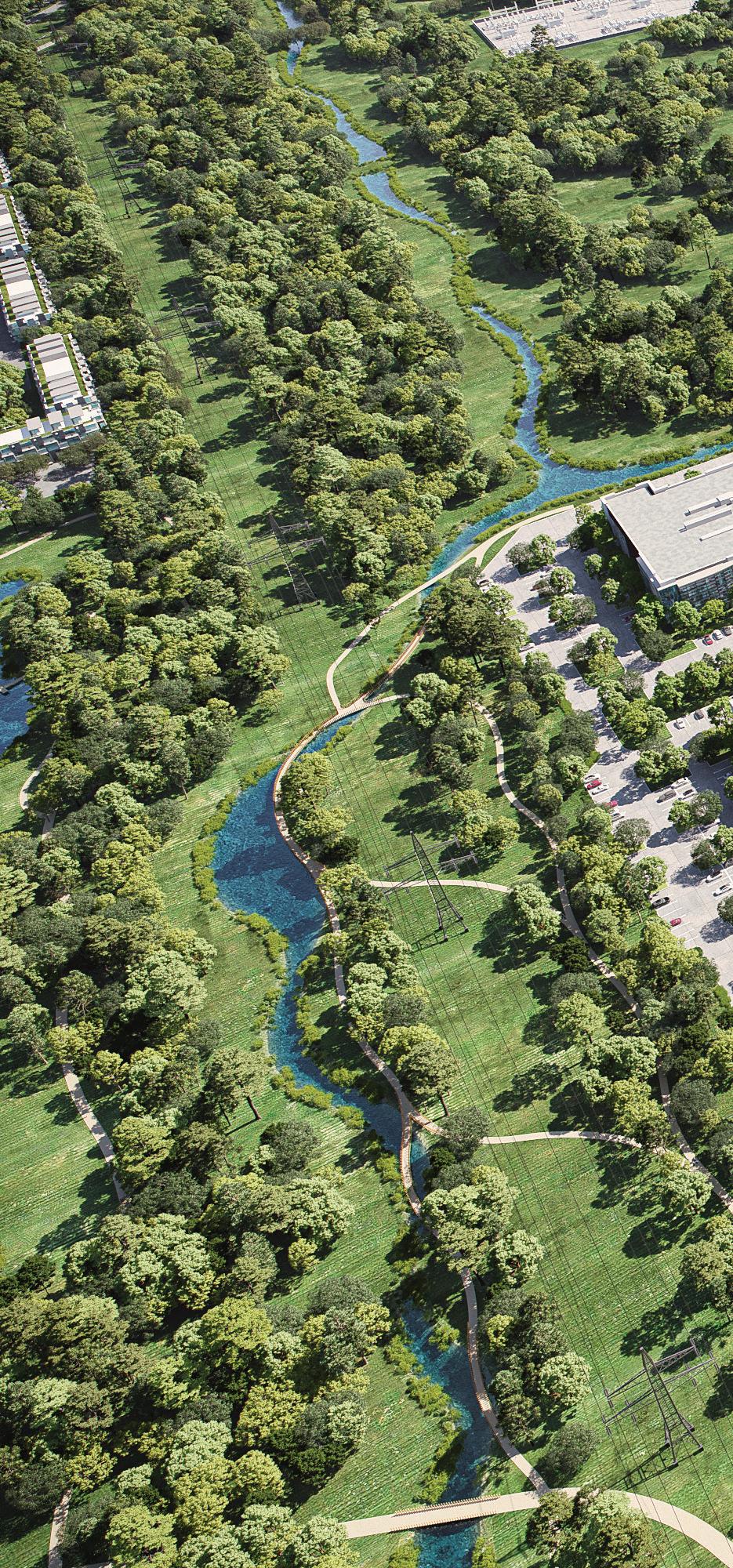
In recent years, the Houston tech economy has seen exponential growth, surpassing $2 billion in venture capital funding - more than four times what it was in 2018.
Houston has a strong tech workforce of nearly a quarter million to fuel more than 9,100 tech firms, including more than a thousand VC-backed tech startups. Due to Houston’s growing tech footprint, it has earned a spot among the top five Emerging Ecosystems


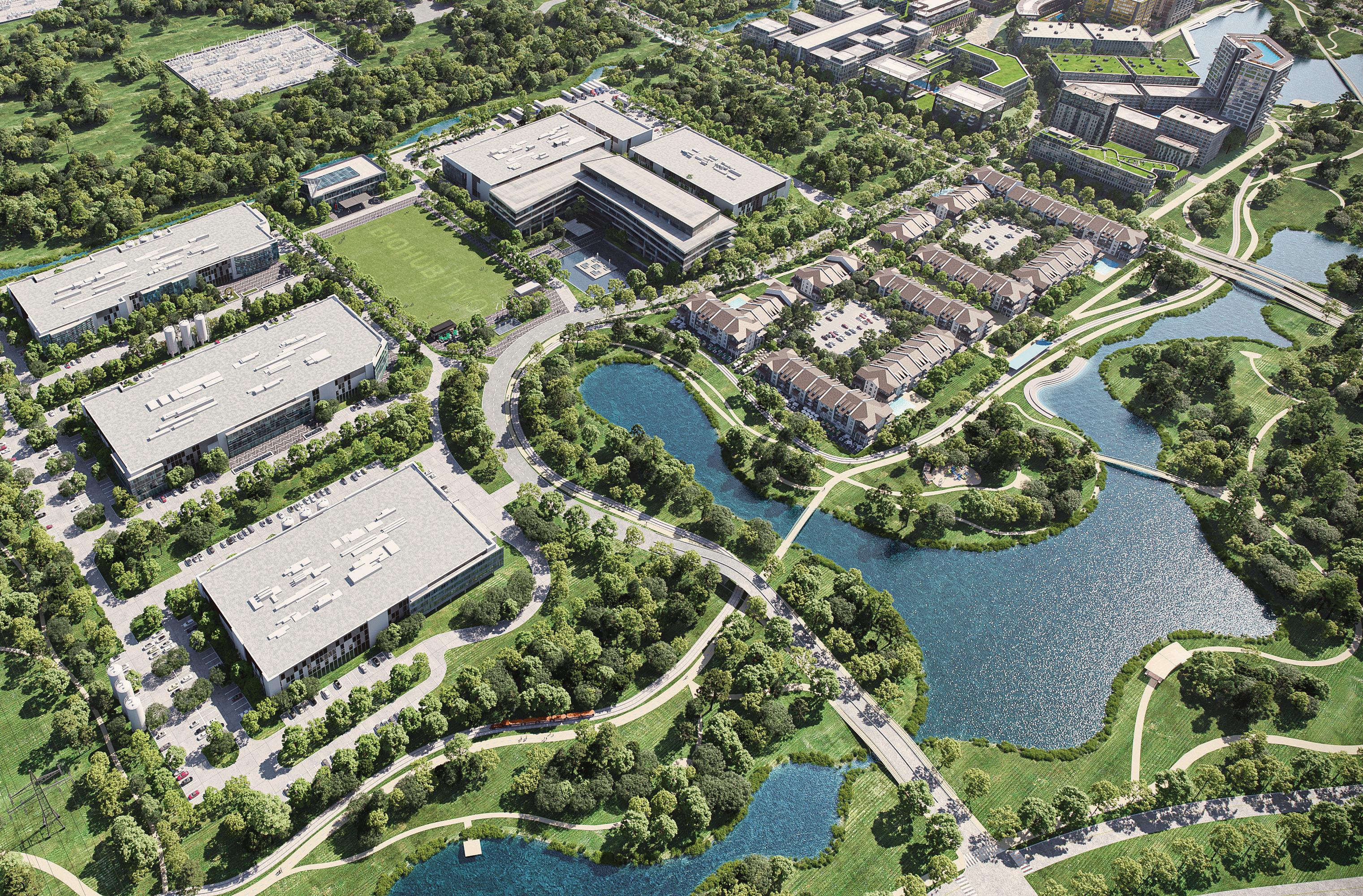
A traveler makes his way through Hobby Airport and, above, BioHub
Two will open soon in Northeast Houston.

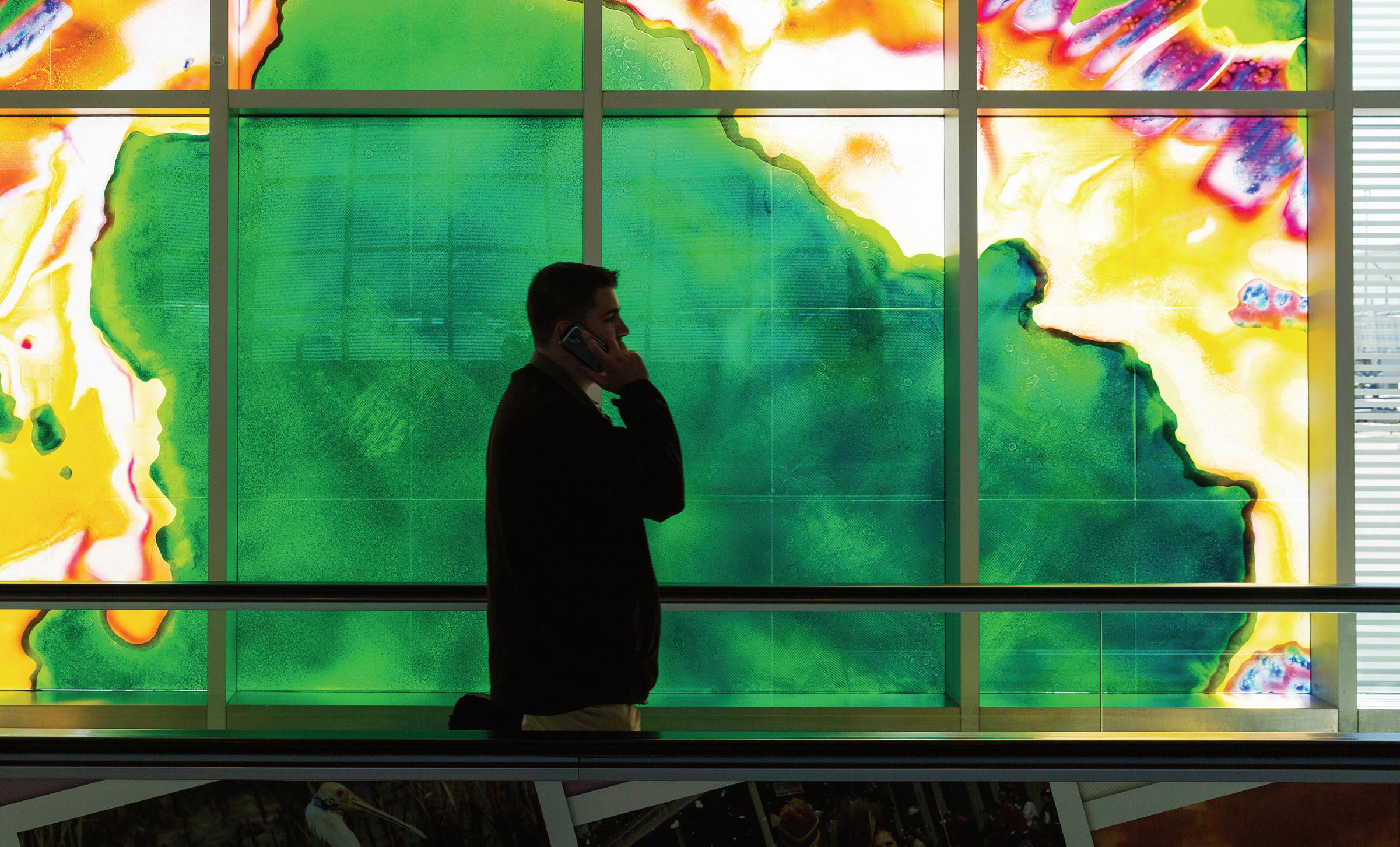


The Ion is a hub of new ideas and collaboration and, above, Houston continues to be a pioneer in space exploration
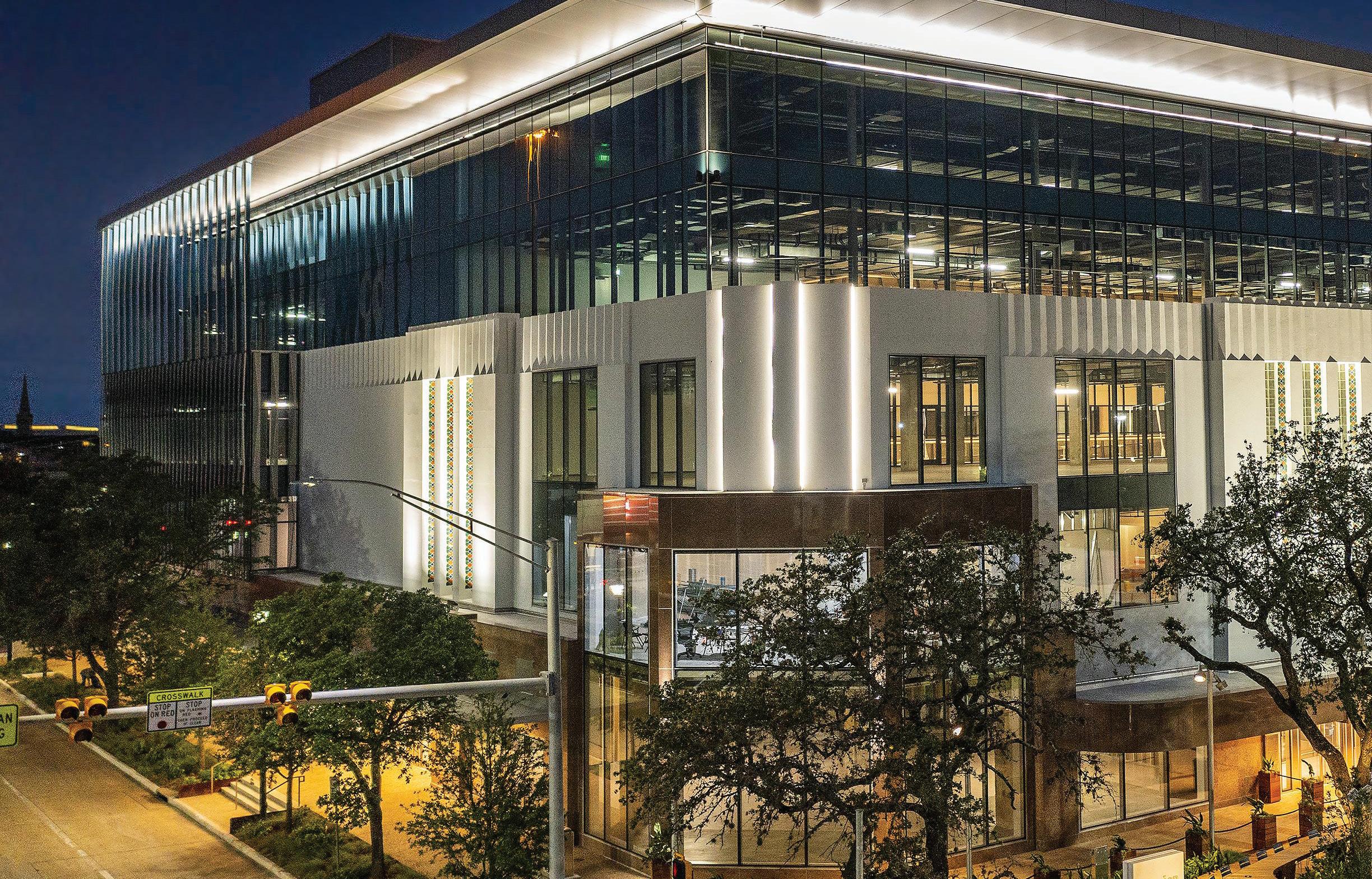
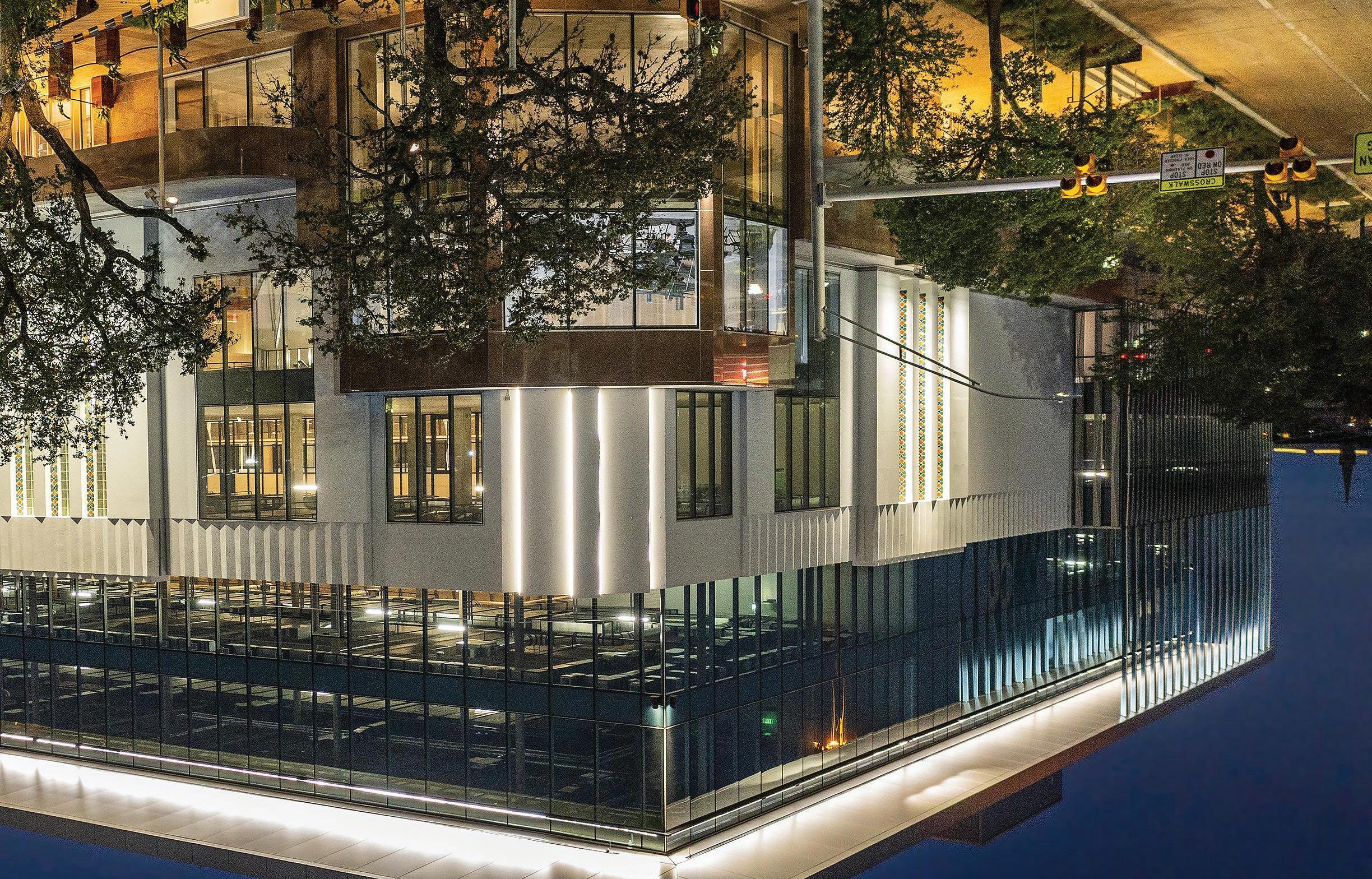


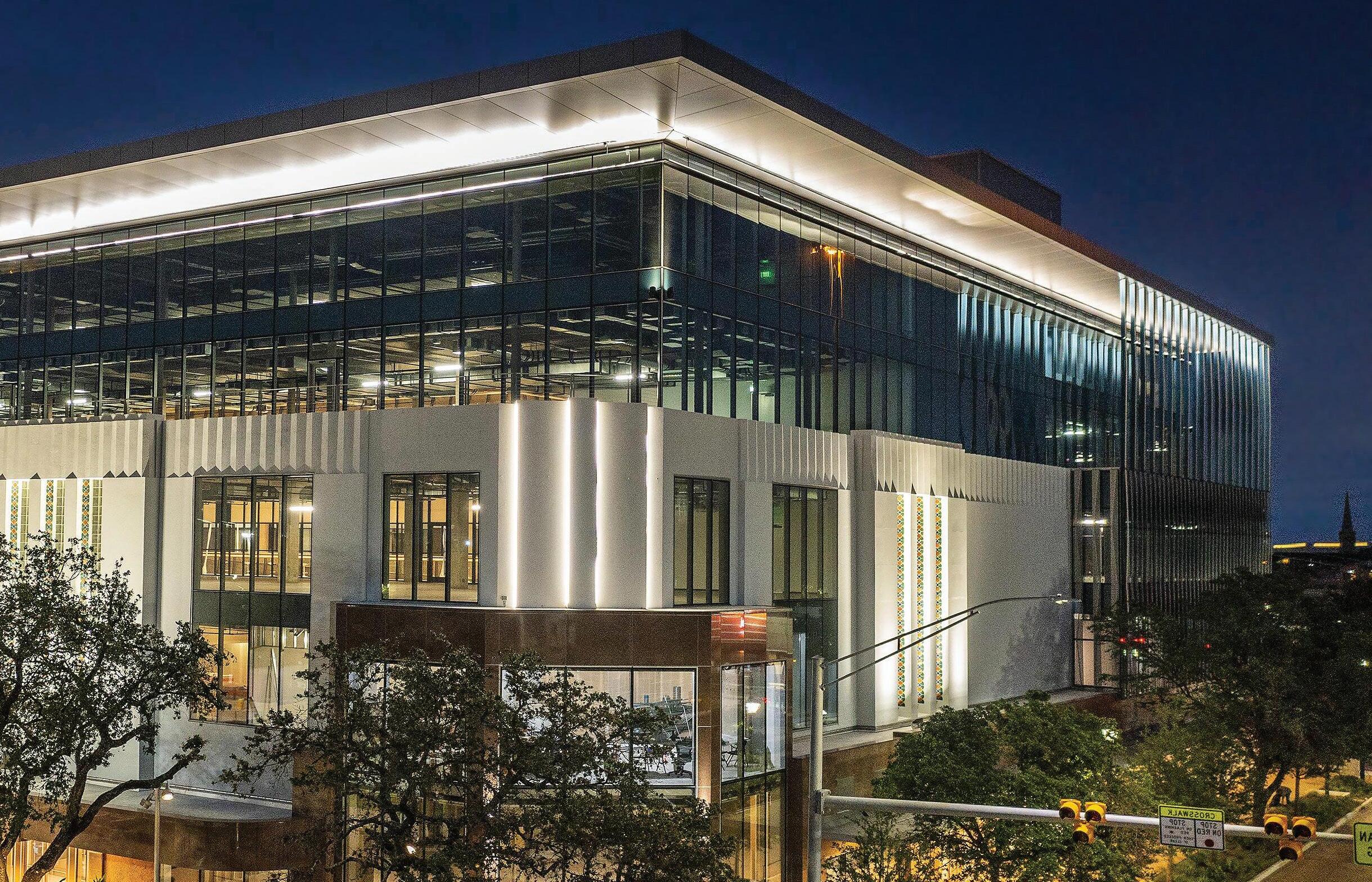
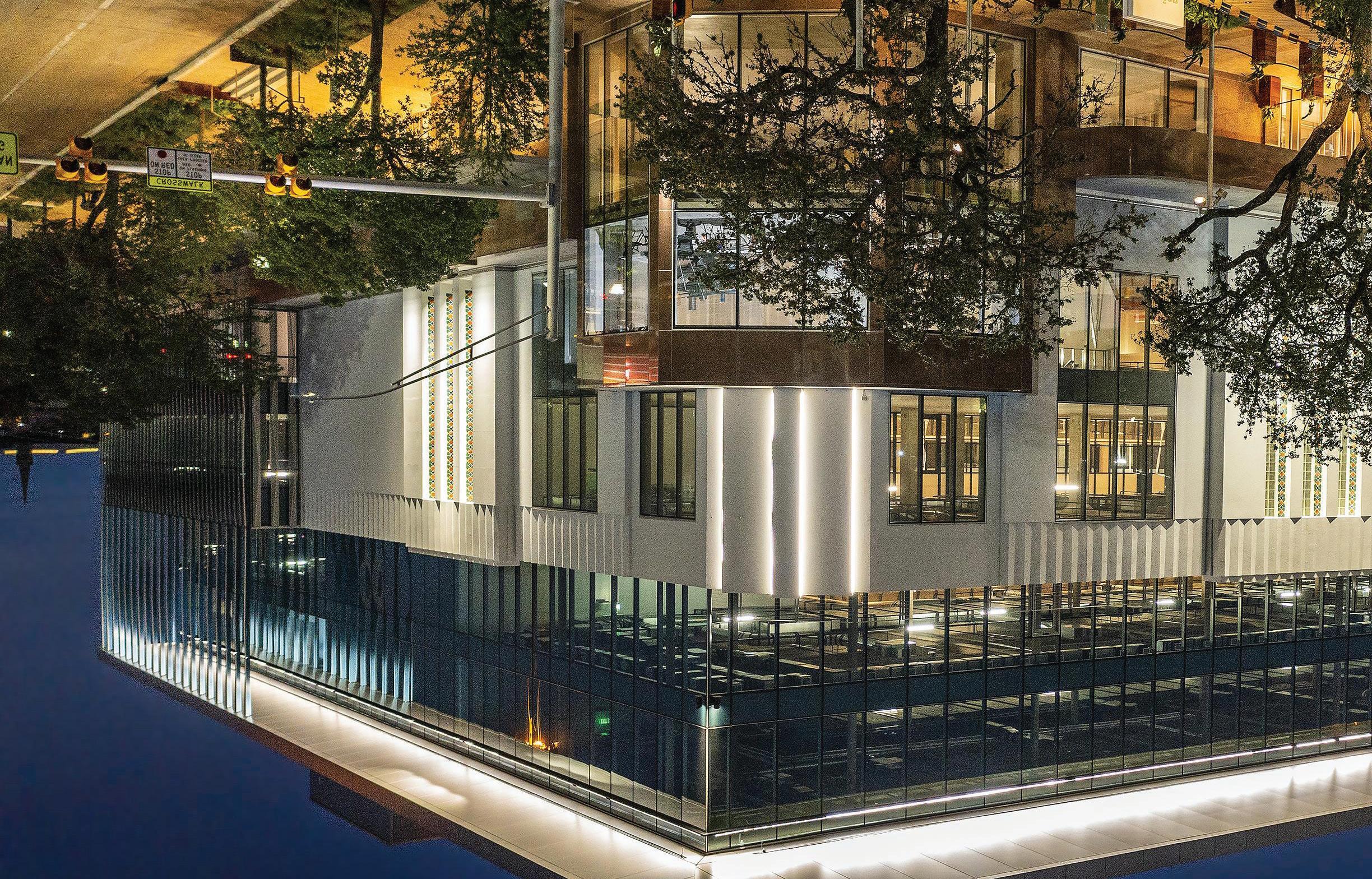

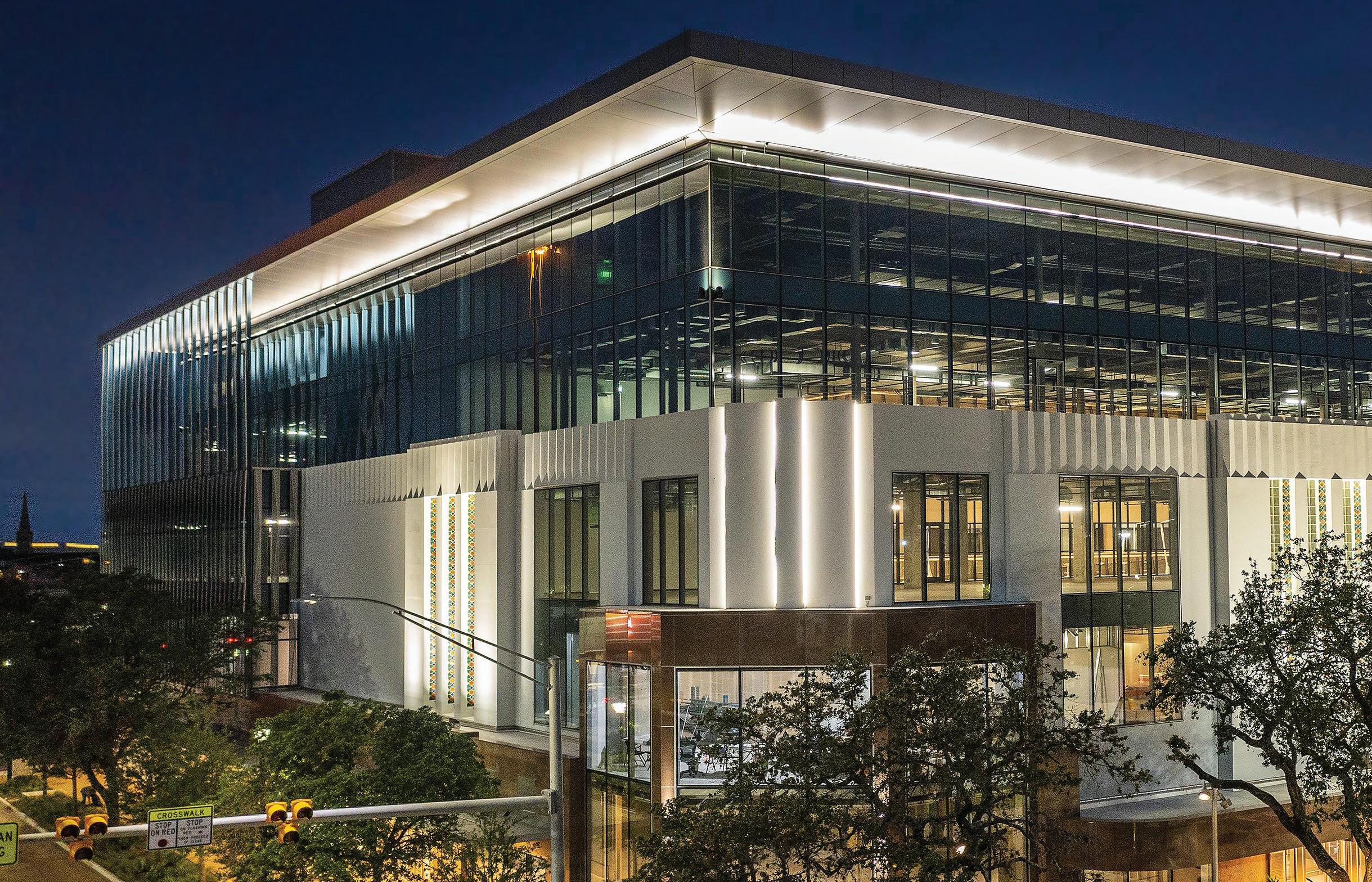

for Startups, according to Startup Genome. The meteoric rise of numerous innovative startups is driving progress in fields such as healthcare technology, energy innovation, artificial intelligence and aerospace and aviation.
“Our tech ecosystem has transformed in recent years. Our collective growth is evident in the increasing volume of activity and collaboration that we’re seeing at The Ion and Greentown Labs. These hubs have been designed to foster new ideas and drive innovation right here in Houston, “ said Joey Sanchez, Senior Director of Ecosystems, The Ion.
Houston’s commitment to becoming a digital tech and innovation hub is evident in its growing tech ecosystem, from nurturing startups and fostering partnerships with established tech giants to embracing digital transformations across various sectors.
Houston, often referred to as “Space City,” is not only synonymous with space exploration but also boasts a thriving aerospace and aviation industry. As the fourth-largest city in the United States, it continues to play a pivotal role in connecting the nation and the world through its extensive aviation infrastructure. The Houston Airport System is at the core of the beating heart of this industry, facilitating the movement of millions of passengers and goods each year.
From an aerospace perspective, Houston continues to strengthen its footprint in pioneering the future of space exploration. Most recently, the newly formed Texas Space Commision awarded $200 million to Texas A&M University for the construction of a stateof-the-art research and training facility adjacent to NASA’s Johnson Space Center, further propelling the state’s commitment to remaining at the forefront of space research and technology.
“What continues to set Houston apart is its unique ability to bring together diverse stakeholders in the aerospace and aviation industry to collaborate on new technologies and initiatives,” said Kevin Tipton, Senior Director of Aviation and Aerospace, Greater Houston Partnership.
With a rich history, a thriving present and a promising future, Houston is poised to soar to new heights in the Aerospace and Aviation sector.

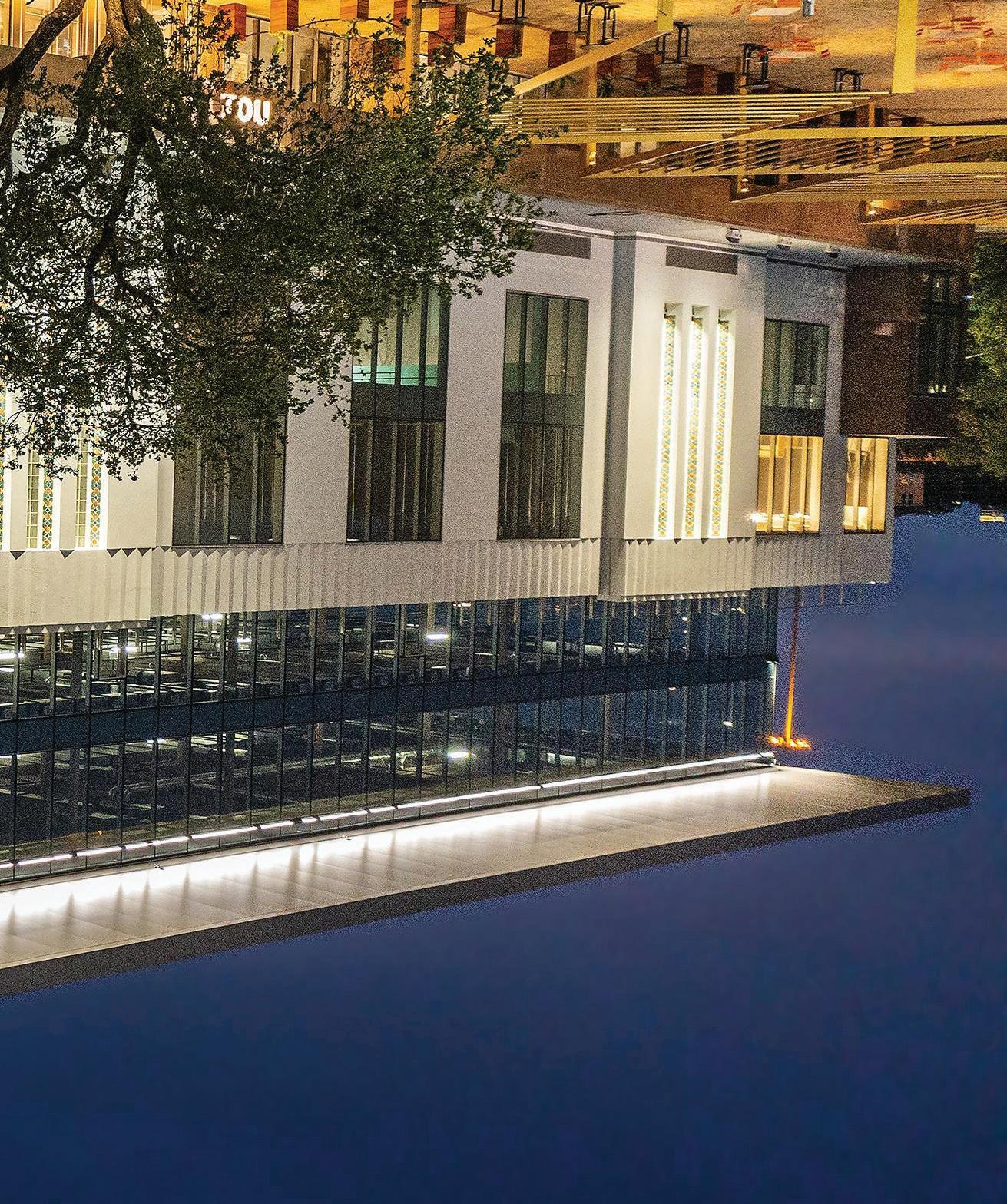
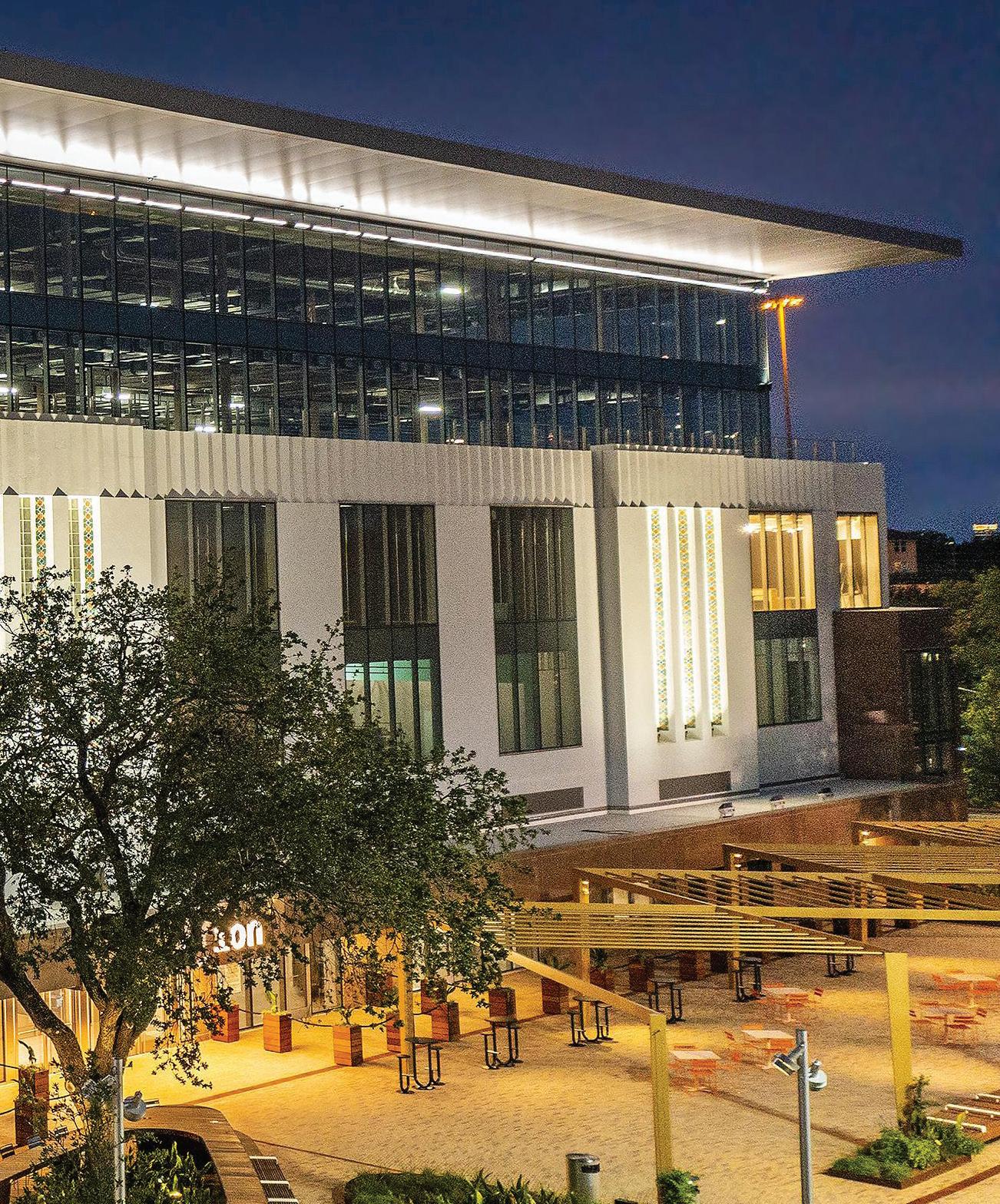

Home to over 4,700 energy-related firms, Houston serves as the domestic and international nexus for virtually every segment of the energy industry, from traditional oil and gas to renewables and carbon management technologies. Houston has been a center for innovation in energy for over a century and is uniquely positioned for continued advancements and emerging technologies as the world looks to minimize its carbon footprint and turn to more efficient, sustainable forms of energy as global demand continues to increase.
In just the last few years, Houston has seen a four-fold increase in new energy venture capital investment, over 220 new low-carbon and climate-tech startups, and a fast-growing energy transition innovation ecosystem supporting collaboration across universities, startups, incubators, investors and corporates to enable the development and scaling of impactful solutions to climate change.
“There is no geography in the world better positioned than Houston to lead the transition to and integration of abundant, low-carbon energy solutions,” said Jane Stricker, Senior Vice President Energy Transition and Executive Director of HETI.
Over the last five years, Houston has seen consistent growth in energy transition investments, exceeding $22 billion in private market energy transition investments. Major energy organizations continue to invest significant funding to innovative energy startups through dedicated business units, such as Shell Ventures, Chevron Technology Ventures, and bp Ventures.
With its healthy funding landscape and thriving innovation ecosystem, Houston is creating an environment that naturally fosters emerging energy technology and supports clean-tech and climate tech startups that are developing solutions for the energy transition. The expansion of Greentown Labs, a Boston-based startup incubator focused on new energy technology, into Houston in 2021 further testifies to the pivotal role that Houston will play in the future of energy.
“Houston has both the opportunity and a responsibility to lead the transition. It is our opportunity to embrace, and our challenge to solve. And when we are successful, we will be creating opportunity for the generations of Houstonians to come,” said Bobby Tudor, Chair, Houston Energy Transition Initiative and CEO of Artemis Energy.
With its diverse ecosystem and forward-thinking approach, Houston’s future shines brightly as a beacon of innovation of progress.

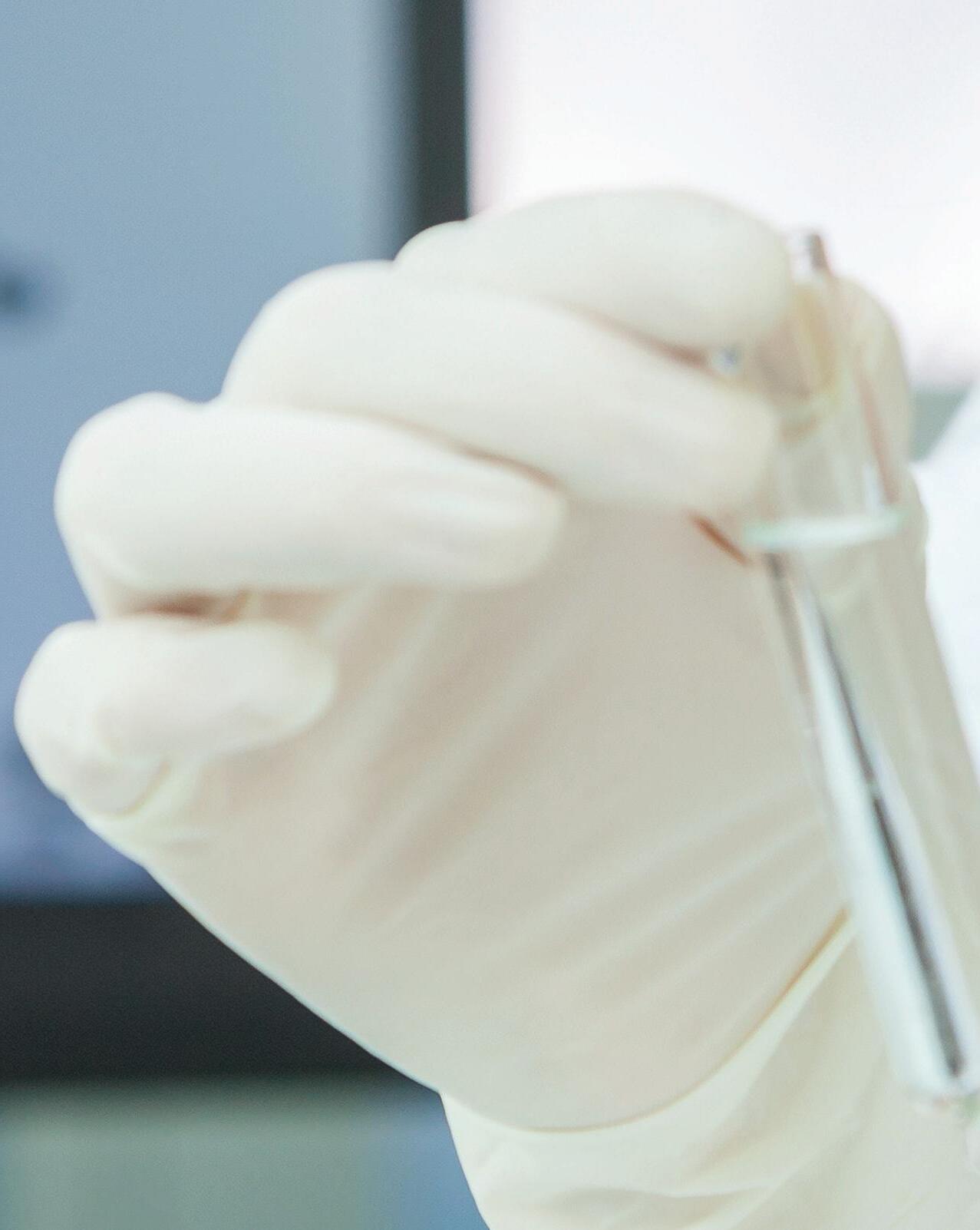 Houston is leading the way on life science research and advancements and, above, Port Houston is the nation’s largest port for waterborne tonnage
Houston is leading the way on life science research and advancements and, above, Port Houston is the nation’s largest port for waterborne tonnage
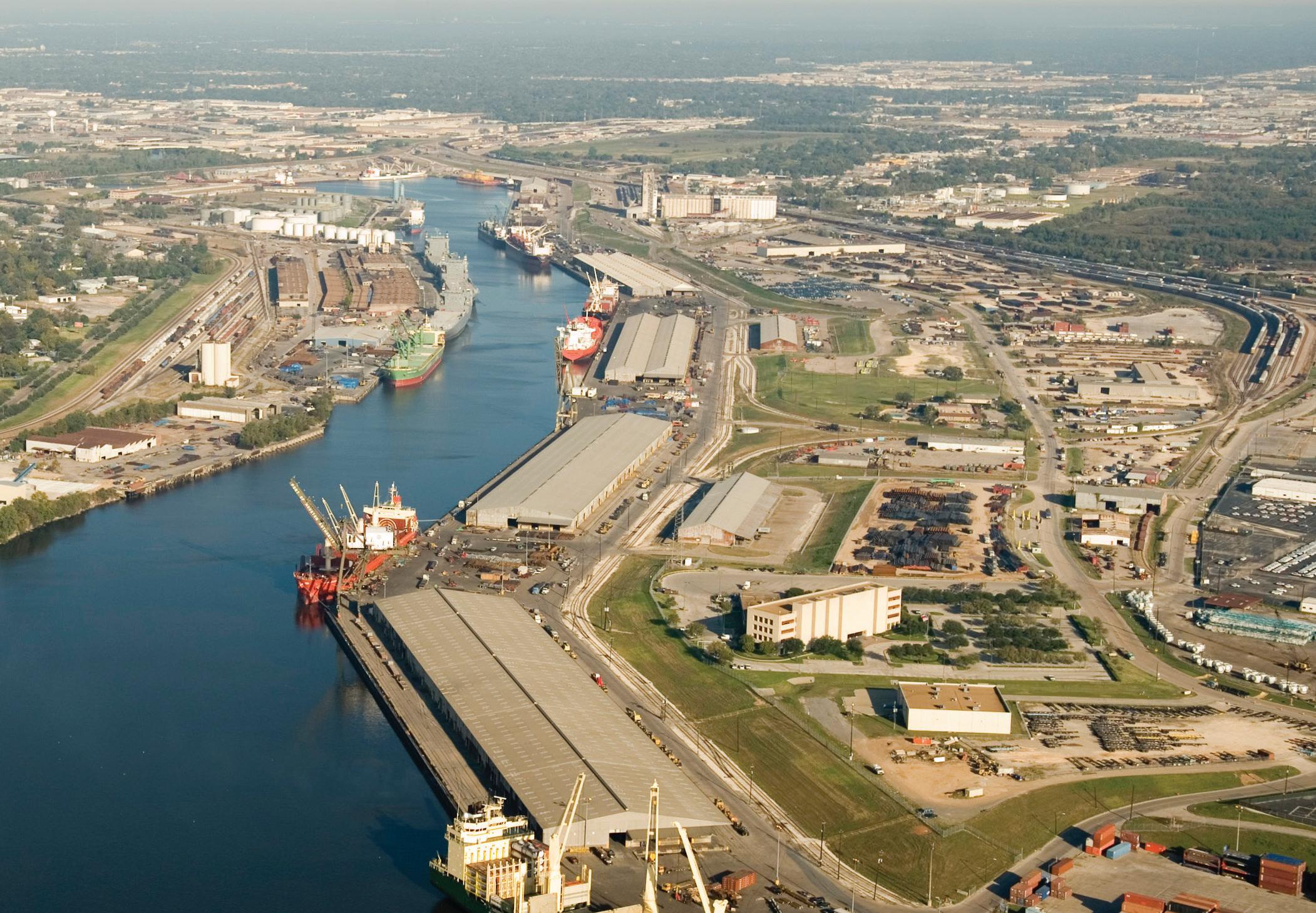

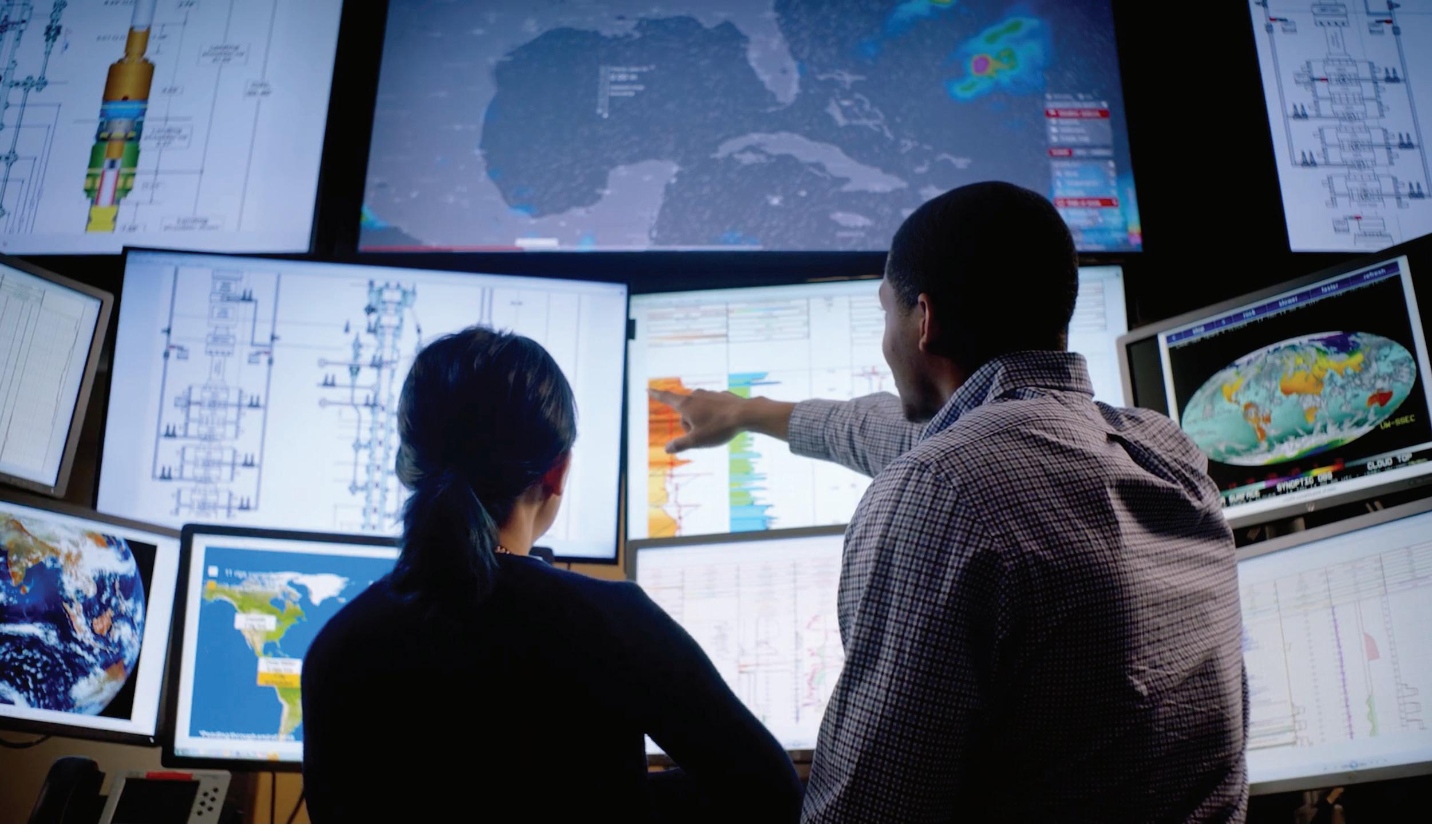
Houston has long been known as a center of corporate and institutional innovation in areas such as energy, aerospace, and life sciences. Houston is home to hundreds of technology and R&D centers, academic research institutes, and civic research centers. Houston’s workforce includes 235,800 tech jobs. In recent years, Houston’s technical and engineering strengths have given rise to a thriving ecosystem of digital technology companies and life science startups. The region is home to more than 8,800 tech-related firms, including more than 800 venture-backed startups.
Houston companies have received over $4.35 billion in venture capital funding since 2016, according to PitchBook. That figure includes a record $2.02 billion received in 2021.
Houston ranks among the best cities for young entrepreneurs thanks to a large supply of young talent and strong university systems. The region is home to more than 300,000 educated millennials and 215,000 STEM professionals. With more than 243,000 tech workers, Houston has the 11th-largest tech sector in the U.S., with a $29.2 billion impact to the regional economy. Nearly two-thirds of Houston’s high-tech workers are employed in industries other than computers and software.
Houston is home to more than 800 venture-backed startups in consumer and business services, health care, data analytics, software, biotech and energy sectors. A strong network of more than 50 incubators, accelerators, makerspaces and coworking spaces has helped strengthen the ecosystem in recent years. These hubs of innovation have created momentum and a critical mass of support for more startups.
The nonprofit Houston Exponential (HX) was formed in 2017 to grow the city’s digital startup ecosystem. Through its $40 million HX Venture Fund of Funds, the organization is investing in venture capital firms that in turn invest in promising startups in order to foster digital innovation in Houston and bolster the region’s tech sector.
DivInc Houston Accelerator
East End Maker Hub
Gener8tor
Golden Section
Venture Studio
Greentown Labs
Halliburton Labs Impact Hub
Ion Aerospace Innovation Accelerator
Ion Smart and Resilient Cities Accelerator
JLABS by Johnson & Johnson
LSA Global (Latino Startup Alliance)
MassChallenge
OwlSpark
Plug & Play Technology Center
Sesh Coworking
TMC Innovation Institute
University of Houston RED Labs
The entrepreneurship programs at Rice University and University of Houston are consistently ranked as two of the nation’s best, according to the Princeton Review.
Rice University ranks third in the U.S. for graduate entrepreneurship.
• Rice’s Owlspark Accelerator has helped launch dozens of companies.
• Rice Business Plan Competition is the richest pitch competition in the country, with awards in ’20 totaling $1.1 million.
• In September ’20, the Rice Alliance announced the creation of a new clean energy accelerator to support early-stage energy startups from around the world.
University of Houston ranks second in the U.S. for undergraduate entrepreneurship.
• RED Labs startup incubator/accelerator has launched 24 companies.
• Graduate students manage the university’s million-dollar Cougar Venture Fund.
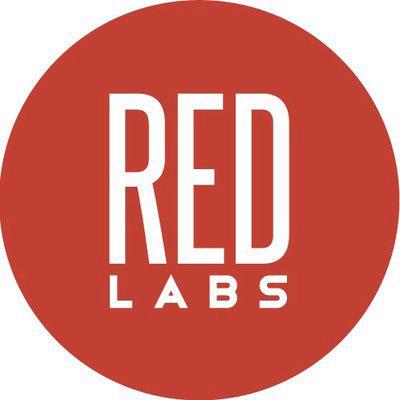



Houston’s Innovation Corridor is at the center of an extraordinarily powerful social and economic convergence. The four-mile-long Corridor is linked by light-rail, bike lanes and sidewalks, and it also offers easy access to key industry and institutional players along with an unparalleled array of amenities.
Anchored on the south end by the world’s largest medical complex, the Texas Medical Center, along with top-ranked universities, the Corridor runs north along Houston’s lightrail line through the 700-acre Hermann Park and oak-lined boulevards of the Museum District. It continues past the eclectic Montrose neighborhood and through Midtown,
home to a millennial-friendly mix of housing, dining and recreational options. The Corridor reaches its northern limit in downtown, the nexus of corporate headquarters, financial institutions and professional service firms, and a wide variety of cultural and recreational amenities.
In 2021, Rice University, along with a coalition of community leaders, opened the first phase of a new Innovation District near the center of the Corridor in Midtown Houston. Anchoring the 16-acre district is The Ion, which serves as the central hub of innovation. At nearly 300,000 square feet, The Ion brings together entrepreneurs, corporations and academic institutions to collaborate
HHouston is among the leading U.S. cities when it comes to tech job growth, according to a new report.
The Bayou City ranks No. 1 in Texas and No. 5 nationwide in terms of increase in tech job postings between the first six months of 2021 and the same period earlier this year. That’s according to a report from the tech site Dice which found that tech job postings rose 83% year-to-year.
Other Texas cities showed significant increases in postings with San Antonio coming in at No. 6 nationwide with an 80% jump and Dallas at No. 15 on the list with a 58% increase in posts. With a 111% increase in tech job posts, Orlando was No. 1 on the Dice list.
The report shows that tech job postings increased 52% nationwide year-over-year.
Houston also ranks among the top 10 cities in terms of total tech job postings, coming in at No. 9. When it comes to states, Texas is behind only California in total tech job postings.
There are more than 243,000 tech jobs in Houston representing nearly 8% of the total metro workforce, according to a recent analysis by the Partnership.
Several tech companies are among Houston’s largest employers including Asurion, AWS, Dell, High Radius, HPE, HP Inc., IBM, PROS, BMC Software, Siemens, Honeywell, Oracle and Microsoft. At least two dozen VC-backed startups valued over $100 million are based in the metro area. Over the last five years Houston startups have received roughly $4.35 billion in venture funding, including $2.02 billion last year alone.

University of Houston’s Cullen College of Engineering
One-third of Houstonians 25 years or older is a college graduate — a rate higher than the national average and Texas’ state average.
Houston is a major corporate center, ranking third in the nation in Fortune 500 — and fifth in Fortune 1000 — headquarters. There are 26 companies on the Forbes Global 500 list that are headquartered in Houston and 83 on the most recent Inc. 5000 list.
Six major business districts are accessible within minutes of executive and international airports.
244.8 million square feet of total office space, with more than 40 million square feet in Downtown alone.
A total of 2 million square feet of office space is under construction (as of Q2 2022).
Aggressive landlord and developer incentives creates exceptional buyer values competitive with top HQ cities.






Source: Fortune, 2021
Houston has the professional and corporate services talent to support some of the world’s largest companies. The region is home to over 700,000 corporate professionals, including administrative, accounting, finance and legal.
305,590 employees Sales
153,730 employees Business and Financial Operations
146,730 employees Management
22,710 employees Legal
467,400 employees Office and Administrative Support
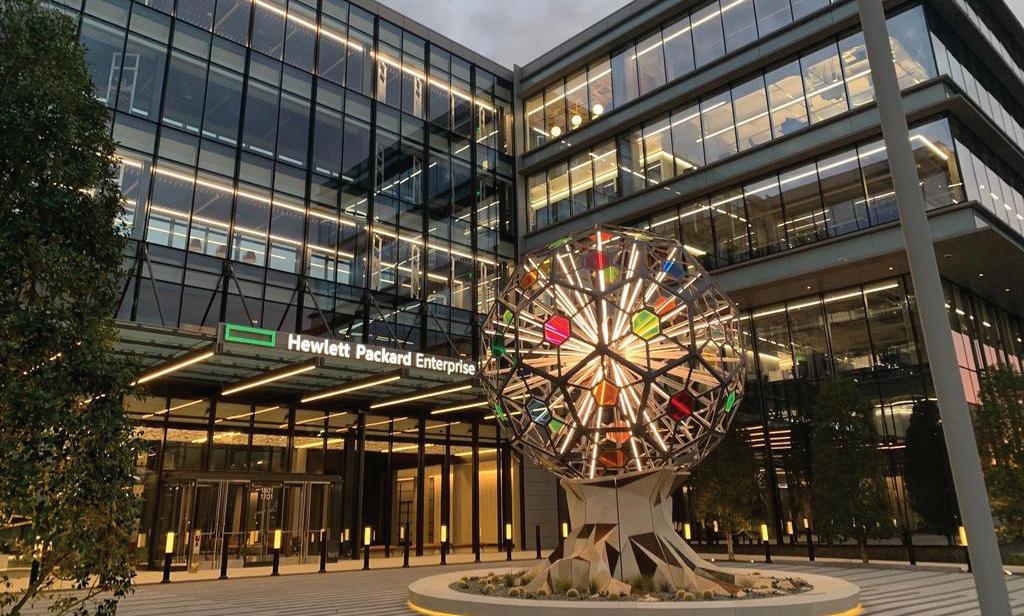
WWhen ExxonMobil revealed plans in January 2022 to relocate its corporate headquarters from North Texas to its campus near Spring in the Houston area, the energy giant became the third Fortune 500 company in a little over a year to announce an HQ move to metro Houston. Following decisions from Hewlett Packard Enterprise in December 2020 and NRG Energy in May 2021, ExxonMobil’s move slated for completion in 2023 will make the region home to 25 Fortune 500 companies, the third largest concentration in the nation.
Companies are currently grappling with what their real estate and talent needs will look like beyond the pandemic. No longer as tied to traditional sector hubs on the East or West Coasts, firms are increasingly eying opportunities in the South and Southwest, following a population base that has slowly migrated to these regions in recent decades. Amid the shuffle, cities such as Houston could experience significant gains, according to Peter Rodriguez, Dean of the Jones Graduate School of Business at Rice University.
Rodriguez said the recent Fortune 500 announcements are a point of validation for Houston—that the city has a sufficient talent pool ready to meet the needs of companies operating at the global level. “Fortune 100s and 500s build and better one another and it’s great for people to associate us in Houston with great companies,” he said.
Rodriguez said that while major companies today can grow
and expand wherever they feel is appropriate for their business model, their headquarters location is certainly often at the top of the list. Houston is likely to see direct and indirect job growth tied to its stable of Fortune 500 companies in the years ahead.
HQ announcements like the one from HPE may help Houston attract fresh attention from tech companies and those in other sectors. Likewise, moves such as Tesla’s HQ relocation to Austin helps build credibility for the whole region, Rodriguez said.
Houston isn’t the only Texas city to gain new headquarters with Austin and Dallas luring major firms from California and other parts of the country in recent years. Rodriguez said while Houston may not immediately gain from relocations to the other Lone Star State cities, there is a regional impact that helps drive talent development and recognition across the Texas Triangle. “It validates the state as a place where companies can grow and prosper,” he said.
A steady supply of quality talent along with stable government regulations and low taxes will continue to lead the list of factors companies consider when weighing HQ locations. But, Rodriguez said, the population shifts to the South and Southwest coupled with advances in technology mean companies are eyeing cities in this region in a new light.
“If Houston can capitalize on this period, we can set the trajectory for the next 40 to 50 years of growth,” he said.
Hewlett Packard Enterprise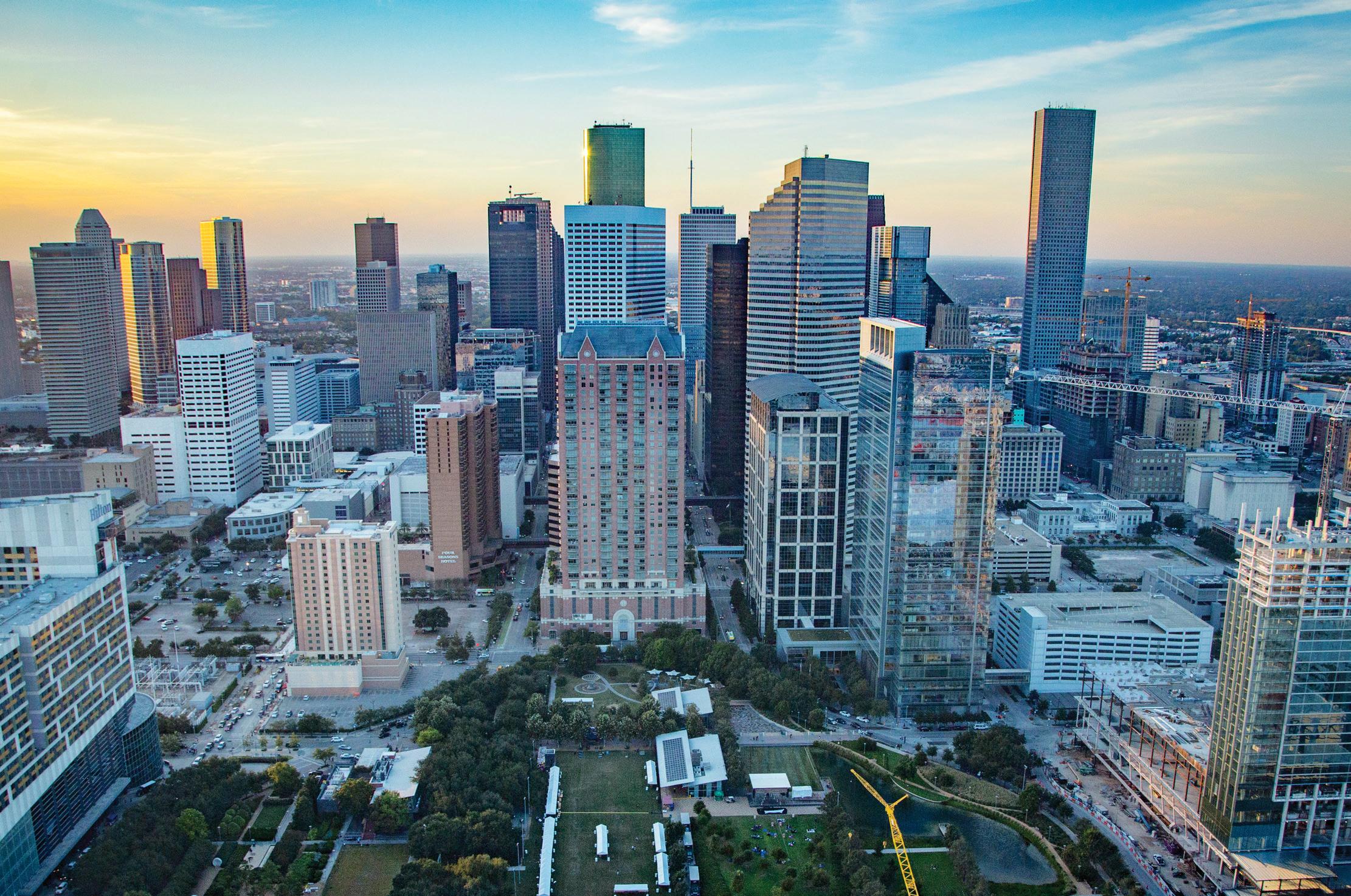
TThe Houston region continues to attract new companies, proving it remains a top destination for companies relocate, expand or establish new operations. According Partnership analysis, the new business category accounted more than 50% of new business announcements
Site Selection Magazine reported the Houston-The Woodlands-Sugar Land MSA won 255 projects in ranking third among large U.S. metros. The Chicago ranked first with 448 projects, while Dallas-Fort Arlington ranked second with 426 projects.
The Partnership reported 199 new business announcements in the Houston area in 2022, a lower number than Selection Magazine due to differences in reporting and data retrieval methods. Manufacturing was the common sector, representing 29% of all announcements, according to the Partnership analysis.
A few noteworthy Partnership-supported projects
• Orsted – a leading offshore wind developer from is expanding its presence in Texas by establishing office in the Woodlands. The move is expected to 100 jobs in the region.
• Syzygy Plasmonics – a Houston-based energy is expanding its operations to Pearland. The will serve as HQ, R&D, and manufacturing deep-decarbonization platform, creating up
• Alfred Talke Logistic Services – a German logistics is establishing a new facility in the region, serving U.S. headquarters. This project represents a investment and will create 240 jobs.

maintain strategic economic development
Maintaining these competitive advantages
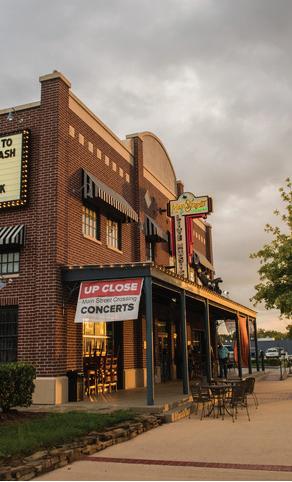
Texas as a whole remains the top destination in the nation for new companies. Site Selection Magazine awarded Texas its 11th consecutive, and 19th total, Governor’s Cup for the most total capital investment projects in the nation for 2022
state legislators are addressing during session. House Bill 5, which the Partnership establish a new economic development attract new businesses.




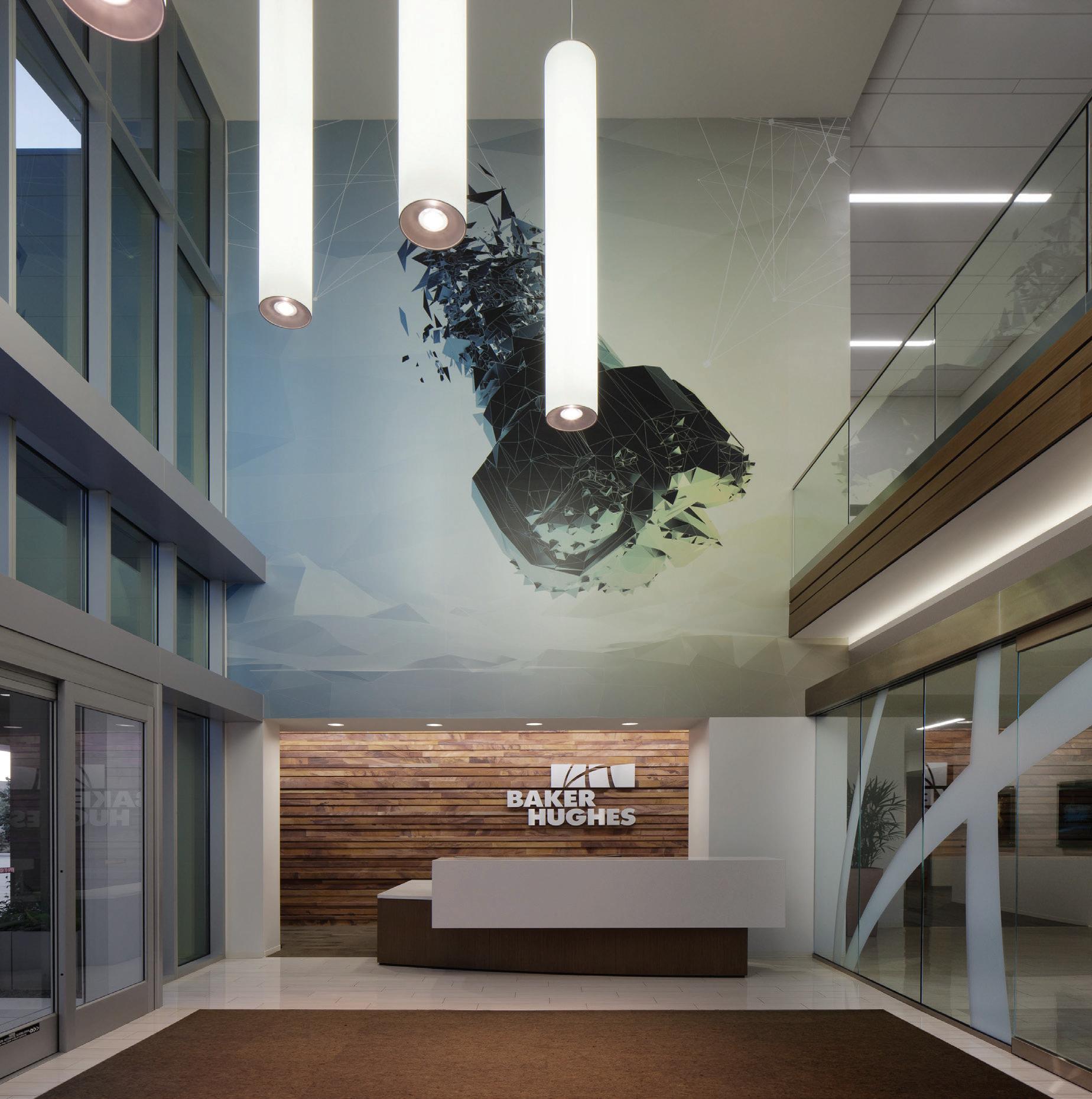

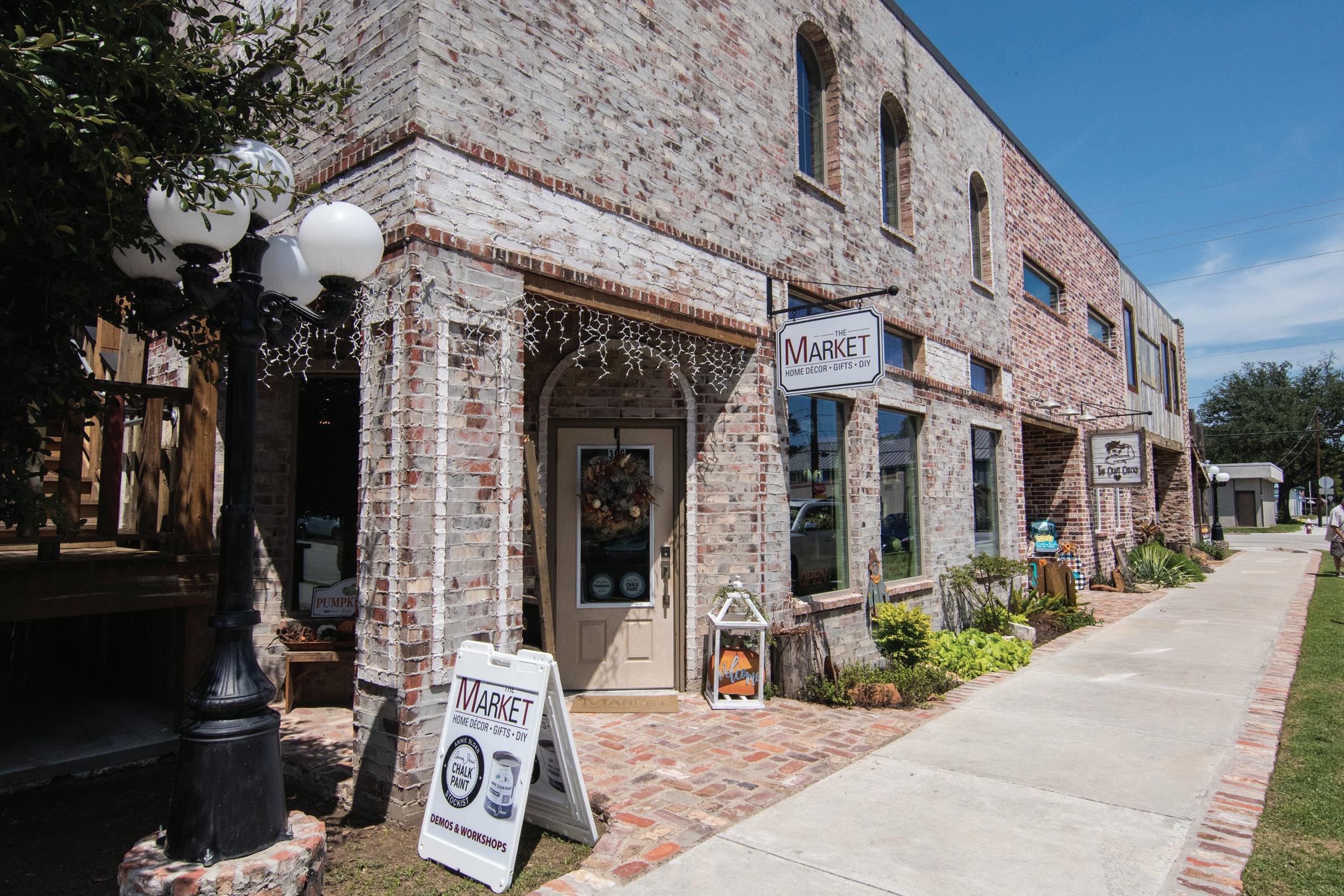

Houston is the Energy Capital of the World and the “brain trust” for virtually every segment of the oil and gas industry, including exploration, production, transmission, marketing and supply, with a growing focus on renewable forms of energy technology. Houston employs a quarter of the nation’s jobs in oil and gas extraction. The region is home to more than 4,700 energy-related firms and is at the forefront of foreign investment in energy, particularly in Mexico. Additionally, Houston’s petrochemical sector has experienced record-level growth, with roughly $50 billion of facility construction recently completed or underway.
Two-thirds of the global integrated oil companies, such as ExxonMobil, Shell and Chevron, have operations here. More than
As the brain trust of the global energy industry, Houston’s ecosystem offers a competitive advantage to energy companies working in solar, wind, biomass and other renewables activities. The region has a growing base of solar energy sources and is home to more than 100 solar-related companies. Texas continues to pave the way by leading the nation in installed wind capacity by state, and Houston is home to 30-plus wind related companies.
In 2021, the Greater Houston Partnership released its blueprint for leading the transition from traditional fuel sources to
half of all oil field service firms based outside of North America have offices in Houston, and around one-fifth of the world’s national oil companies, including Saudi Aramco and Gazprom, have operations in Houston.
As these companies work to diversify technologies and generation mix, Houston’s high concentration of energy expertise and experience has meant a large number of relocations to the region in recent decades. The metro offers access to three million workers and more engineers than any other U.S. metro. Today, Houston is working to become the energy transition leader, capitalizing on its talent base and industry know-how to help guide the world to a low-carbon future.
low carbon and no-carbon energy. The strategy sets out three initial objectives for the region: jumpstarting emerging technologies and markets where Houston has a strategic advantage, attracting and supporting companies in established yet rapidly growing “new energy” industries and creating an environment that encourages investment in — and deployment of — a wide range of value chains. The latter includes everything from nature-based solutions and cleaner production of natural gas to breakthroughs in hydrogen development, geothermal energy and advanced materials.
4,700+ energy-related firms in Houston
More than 430 exploration and production firms and 760 oilfield service companies
Potential to create more than 500,000 new energy jobs by 2050
144+ online wind projects across Texas
65+ energy tech companies
Gulf of Mexico The Atlantis platform was the deepest moored floating oil and gas production facility in the world at the time of its installation.GGreentown Houston’s success in its first year proves the world’s energy capital is fostering the next generation of companies that will help lead the global energy transition.
In April 2022, Greentown celebrated its one-year anniversary by announcing they’re now home to more than 60 startups, including several that relocated from outside the U.S., after opening their doors with only 16. According to InnovationMap, it took Greentown Labs’ headquarters in Boston years to gain that many members.
As Greentown searched for its first out-of-state location, Houston was the one city that made sense, according to Emily Reichert, former CEO of Greentown Labs.
“[Houston] was the only city that had the engineering strength, talent, and assets to broaden our impact and help to accelerate the energy transition through innovation and entrepreneurship,” Reichert said in April.
Many of Greentown Houston’s members have reached milestones of their own, including Syzygy Plasmonics, which has experienced significant growth in its four years. The company, which uses photoreactor technology instead of heat to drive chemical reactions, recently announced it leased a building in the Houston suburb of Pearland for its headquarters and manufacturing facility. According to the startup, the “technology has the potential to electrify the chemical industry, shifting it to renewable electricity, and cost-effectively reducing its carbon footprint.” The U.S. Department of Energy’s National Renewable Energy Laboratory recognized Syzygy Plasmonics as the most outstanding venture in the commercialization stage during the 2022 Industry Growth Forum.
Cemvita Factory, another Greentown Houston member, announced a $5 million investment from United Airlines

Ventures to develop sustainable aviation fuel sources this year. The company uses biotech to convert carbon dioxide emissions into various useful chemicals.
In a newsletter released in April, Juliana Garaizar, Head of Houston Incubator and VP of Innovation, thanked members and supporters for the climatetech hub’s achievements.
“We are very hopeful about the future and bringing more climate solutions to Houston and the world at a faster pace, consolidating our role as the Energy 2.0 capital,” she said.
Greentown’s success is just one example of how Houston is paving the way in the global energy transition. The city is also making progress in building a more sustainable region under its Climate Action Plan.
June 2022 marked one year since the Partnership released the Houston Energy Transition Initiative (HETI) plan, a strategic regional blueprint for leading the global energy transition to a low-carbon future. In addition, the Center for Houston’s Future released a report that reveals how the region is poised to become a global clean hydrogen hub.
Another example of the region’s commitment is the industry giants investing and collaborating with clean energy startups and building partnerships with academic institutions, including Shell’s $10 million gift to establish the University of Houston’s Energy Transition Institute and their partnership with Prairie View A&M.
Reichert believes Houston is well-positioned to be a leader if global corporations with either operations or headquarters in Houston continue investing in climate change solutions.
“We have the potential to decarbonize not just one city, but create a model for similar cities across the globe, and build the diverse and inclusive energy workforce of the future we need in the process,” she said.

As a hub for medical device manufacturing, pharmaceuticals and health research, Houston has more than 1,100 life sciences and Biotechnology companies. The health care and life sciences industries collectively employ more than 375,000 workers — well over the number employed in Houston’s energy sector.
The region’s growth in employment, high concentration of key scientists, National Institutes of Health (NIH) funding, quality and quantity of educational institutions, medical research and health services institutions, and number concentration of high-tech workers recently landed the region a spot on real estate giant JLL’s list of top life sciences markets in the nation.
Houston is home to the largest medical center in the world — Texas Medical Center (TMC). Bringing together the brightest minds, TMC nurtures cross-institutional collaboration, creativity and innovation through its 60-plus member institutions. From some of the world’s leading hospitals to the world’s largest steam and chilled water facility, Houston institutions are making an impact worldwide.
In the field of health and medical technology, the TMC Innovation Institute coordinates the efforts of several life science-focused incubator and accelerator programs. The organization aims to help startup companies commercialize new medical technologies by providing access to the vast resources of the world’s largest medical center. Venture capital and private equity investment in Houston life science startups totaled nearly $1.5 billion over the last five years, the region’s largest sector of VC funding. Additionally, the TMC Venture Fund aims to invest $25 million in early-stage health care tech companies in Houston.
In 2021, TMC broke ground on TMC Helix Park, a multiinstitutional 37-acre research campus that will bring together the best institutions in clinical care, research and industry. The campus is projected to bring $5.4 billion to Texas’ economy.

Texas Medical Center features:
10 million patient encounters per year
50 million developed square feet
$3 billion in construction projects recently completed or underway
120,000+ employees
8th-largest business district in the U.S.
World’s largest cancer hospital and children’s hospital

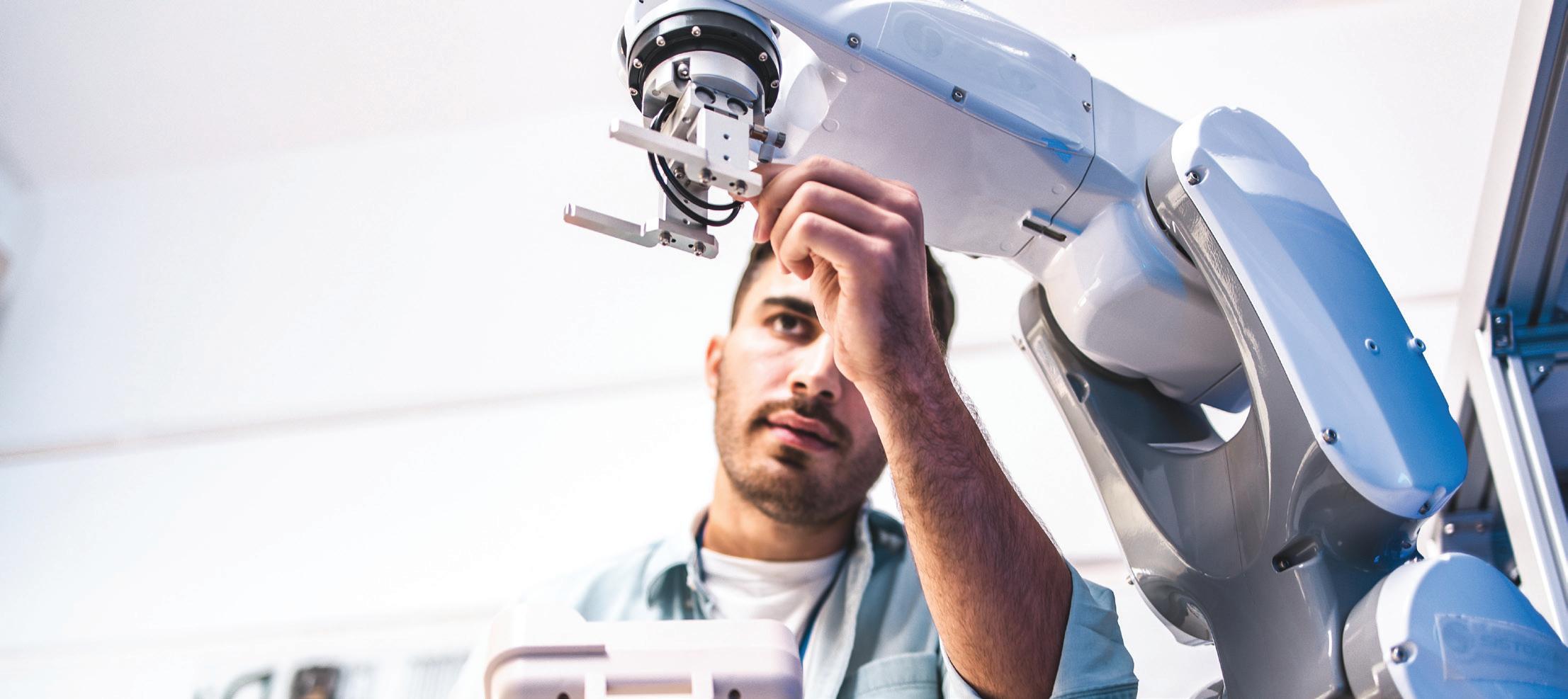
HHouston is known for its world-class institutions and professional talent in the healthcare and life sciences industries, so it comes as no surprise that healthcare systems, academic institutions and medtech startups are being recognized for their innovations. Here are just a few examples:
The University of Houston recently made news with its creation of a robotic arm that can be controlled by a patient’s brainwaves – it’s considered a gamechanger for stroke patients. According to UH, engineering professor Jose Luis Contreras-Vidal and his team developed the portable brain-computer interface (BCI) exoskeleton to restore upper limb function. Contreras-Vidal’s innovation differs from similar technologies because the braincontrolled robotic arm doesn’t require surgery and is available to a patient both at home and in a clinic. Most neuro technologies are limited to a lab or clinic and are expensive and hard to operate, according to UH.
Brain-controlled robotic arm can be used by stroke patients to recover the use of a limb. “The broader impact and commercial potential of this project is to advance national health by accelerating development, efficacy and use of braincontrolled robotic rehabilitation after stroke by capitalizing on the benefits of non-invasive brain interfaces that extract information about the patient’s motor intent and the real-time assessment of impairment and recovery of motor function,” said Contreras-Vidal.
HCA Houston Healthcare Medical Center successfully completed a robotic-assisted coronary angioplasty, according to InnovationMap. The technology allows doctors to perform the procedure inside a radiation-protected cockpit by using a
joystick to robotically place catheters, angioplasty balloons, and stents to clear a blockage and restore blood flow. Doctors say the robot-assisted surgery is safer and more precise.
Earlier this year, two other HCA Houston Healthcare hospitals also celebrated milestones. The hospitals performed their first peripheral lung biopsies using robotic-assisted technology, according to InnovationMap. The technology allows doctors to go through the lung’s natural airways, lowering the risk of complications. It also supports the early diagnosis of lung disease when used as a screening tool due to the technology’s ability to examine hard-to-reach areas.
Houston-based medtech startup, CorInnova, was recently accepted into an international accelerator program, MedTech Innovator. CorInnova has created what they describe as the world’s first minimally invasive robotic cardiac-assist device that treats acute heart failure without touching the blood. The device’s ability to collapse and self-expand makes it a less invasive option compared to other devices, according to the company. Existing devices also have higher risks of side effects, including elevated risk of stroke, blood damage and kidney problems.
According to MedTech Innovator, their accelerator programs aim to promote the growth of early and mid-stage startups by working closely with stakeholders across the industry.
CorInnova has previously been a part of accelerator programs at TMC Innovation and is currently a resident at JLABS @ TMC. JLABS provides startups access to a medical device prototype lab and highly specialized tools to further advance their innovations.
Houston ranks No. 13 in CBRE’s latest analysis of the nation’s top 25 life sciences markets.
The Greater Houston Partnership is the region’s premier business organization, representing 12 counties and more than 900 member companies that work together to advance Houston as a great global city. The Partnership is an Accredited Economic Development Organization as designated by the International Economic Development Council, and a certified World Trade Center.
Initiate property searches
SITE TOURS
Coordinate siteselection visits and regional briefings
The Greater Houston Partnership’s economic development and international investment team is a one-stop shop to confidentially assist your business growth and relocation needs. The Partnership works with the region’s top business and civic leaders, including economic development agencies at the state and local level.
PERMITS
Advocacy for projects and regulatory issues
Assist in evaluating and applying for benefits

RESEARCH
Provide data on key business and site factors
Direct access to top business and civic leaders
For more information about Houston’s business climate, or expanding in the region, visit HOUSTON.ORG

The region’s workforce includes 223,000 industrial workers.

Houston is one of the most important industrial bases in the world. There are more than 7,000 manufacturers in the region producing $75 billion in products annually. The skilled workforce includes more than 225,000 industrial workers, and Houston subsector specialties include fabricated metal, machinery and chemical manufacturing. One out of every 13 workers in metro Houston is employed in manufacturing, and the sector accounts for more than 14 percent of the region’s GDP.
No. 2 among U.S. metros for manufacturing GDP
Nearly 1 in 3 manufacturers in Texas call Houston home
27 million consumers within 300 miles and roughly half of the U.S. population within 1,000 miles
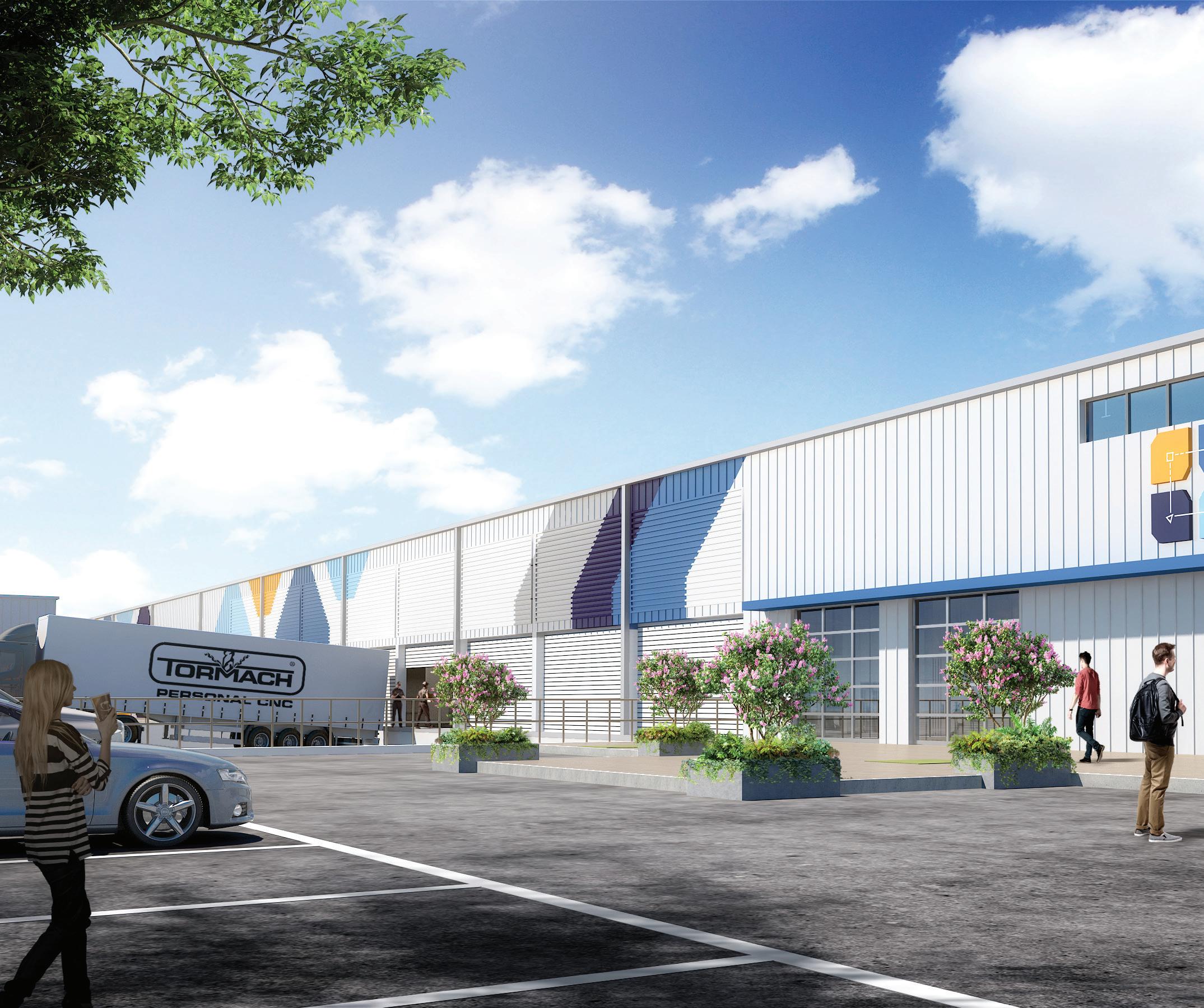
AAn autonomous rover dubbed the “layout Roomba” that marks architectural and engineering designs directly onto unfinished concrete floors is one of many examples of the innovation happening in Houston’s advanced manufacturing sector. The city boasts a thriving tech ecosystem and is considered a global manufacturing powerhouse due to its central geographic location, unparalleled infrastructure and talented workforce.
Funding is now flowing into Houston to help drive the next wave of manufacturing innovation. According to the Partnership’s 2022 Houston Tech Report, more than 900 investors have funded over 1,500 venture capital transactions in the Houston region over the last five years. Data shows that 8.6% of all VC deals are funding manufacturing projects with another 8.7% funding AI and machine learning ventures.
“I think Houston is a great place to start a company. It hosts a diverse pool of exceptional talent, a reasonable cost of living and a welcoming start-up community,” said Derrick Morse, CEO
and founder of Rugged Robotics. “Houston is also home to a number of innovative companies that solve really hard and really important problems.”
Rugged Robotics, a Houston startup company founded in 2018, hopes to revolutionize the construction industry by tackling the challenge of field layout by using its small robot to create a more detailed, more accurate and faster way of doing the work. Traditionally, a construction worker must do the marking manually using tape measures, chalk lines and surveying equipment. Morse, a construction industry veteran, said he saw a need to solve a pain point in the construction industry.
“By focusing on the problem, and by developing a practical solution, we’ve unlocked a very exciting opportunity,” Morse said.
Rugged Robotics is operating out of the East End Maker Hub, a makerspace and manufacturing center in Houston’s East End.
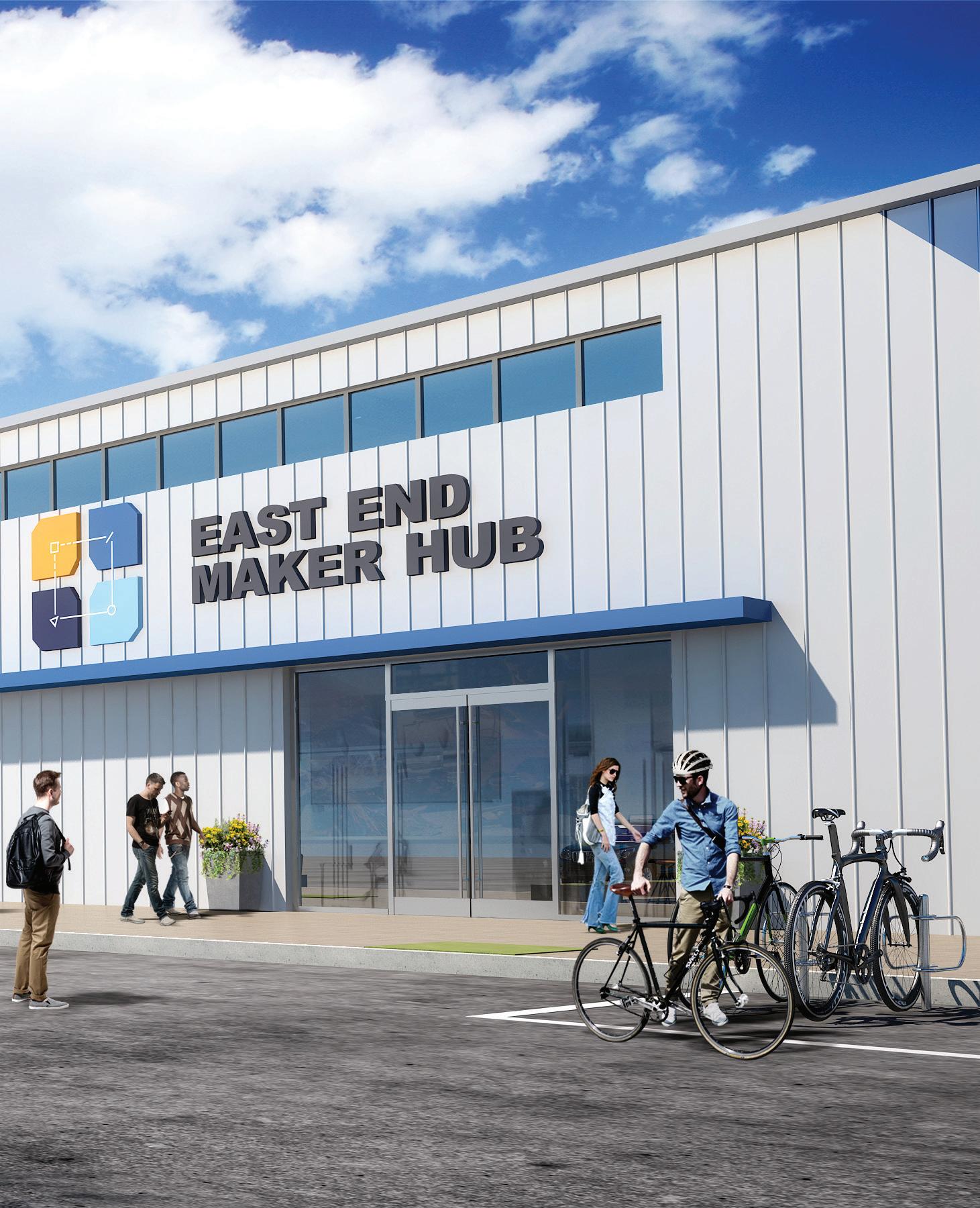

Morse said it was a no-brainer to choose the incubator as they started growing.
“The East End Maker Hub was initially attractive for two reasons,” Morse said. “First, access to the machine tools and rapid prototyping equipment we were familiar with at TXRX, and second, flexibility.” He added that the flexibility of the leases allows the company to move into bigger spaces as they evolve.
June 2022 marked one year for the $38 million innovation hub. At the time, Urban Partnerships Community Development Corporation said the facility is 95% occupied with 49 tenants from candle making to biotech/manufacturing, a sign of a successful first year. The East End Maker Hub aims to create 1,000 new companies over the next five years to boost Houston’s advanced manufacturing jobs. Houston has one of the largest manufacturing workforces in the country with more than 213,100 workers, but it declined by 8.6% between 2015 and 2020, according to the Partnership’s analysis.
“We’ve retained or created over 330 jobs thus far and aim for 500 in the coming years. We’re a model for how to use public funding to jump start development to support the entrepreneurial ecosystem,” said Natasha Azizi, Executive Director of UP CDC and East End Maker Hub.
The East End Maker Hub is part of several landmark projects to position Houston as a national leader in tech innovation. According to the Houston Tech Report, venture capital investments have grown from $423 million in 2017 to $2.02 billion in 2021, a near five-fold increase and an unprecedented 47.4% growth rate per year.
Rugged Robotics recently raised $9.4 million in Series A funding to help the company hire more people, expand its products and more.
“We’ve built an amazing foundation, and I’m excited by the road ahead. Our team is truly inspiring. I can’t wait to see what we’re capable of,” Morse said.
Rugged Robotics’ “Layout Roomba” and, at left, East End Maker Hub
Years before the historic Apollo 11 mission in 1969, Houston was a pioneering hub in the aerospace and aviation sector. But the mission didn’t stop at the moon. Over the decades, Houston scientists and engineers have helped with some of the world’s biggest space endeavors, including running mission control for the International Space Station for 20 years. Some of the sharpest minds in aerospace and aviation technology continue to chart a vibrant future for Houston centered around NASA’s Johnson Space Center and one of the world’s only truly urban commercial spaceports.

The thousands of NASA employees and civilian contractors supporting JSC’s operations have created a rich talent pool of aerospace expertise, positioning Houston as a leader in the emerging commercial realm of space flight. In addition, Rice Space Institute has helped to establish Rice University’s international reputation in all areas of space research by investing in efforts to further the development of new ideas and innovation in space exploration and utilization.
Houston Spaceport is an FAA-licensed, urban commercial spaceport offering unprecedented access to a thriving aerospace community. In addition to serving as a future launch and landing site for suborbital, reusable launch vehicles, Houston Spaceport offers laboratory office space, including technology incubator space and large-scale hardware production facilities.
As a center for collaboration and innovation, Houston Spaceport is unique among the other federally licensed spaceports. Located in the fourth largest city in the U.S. and a major hub for aerospace and aviation activities, no other spaceport can boast such a connection.
Forming a part of the Houston Airport System and situated at Ellington Airport, the spaceport fits seamlessly into one of the world’s largest international travel infrastructures. In addition to improving existing facilities and services, the spaceport continues to find new and groundbreaking ways to increase value for tenants and partners.

500 space, aviation and aerospace related firms and institutions
$2.9 billion in total trade in aircraft, spacecraft and parts
11,000+ NASA Johnson Space Center employees and contractors
100+ active astronauts and astronauts in training


NNASA has selected two aerospace companies with a Houston presence to move forward in developing next-generation spacesuits and spacewalk systems. The June 2022 announcement marked the latest in a series of high-profile developments that are reigniting Houston’s aerospace industry.
Axiom Space, which broke ground in early 2022 on its headquarters at Houston Spaceport, and Collins Aerospace, which is building a manufacturing facility and startup incubator at Houston Spaceport, will compete for task orders under the Exploration Extravehicular Activity Services (xEVAS) contract. The contract has a maximum potential value of $3.5 billion through 2034.
“With these awards, NASA and our partners will develop advanced, reliable spacesuits that allow humans to explore the cosmos unlike ever before,” said Vanessa Wyche, NASA’s Johnson Space Center Director. “By partnering with industry, we are efficiently advancing the necessary technology to keep Americans on a path of successful discovery on the International Space Station and as we set our sights on exploring the lunar surface.”
The spacesuits will be for the International Space Station crew, astronauts on Artemis missions and future human missions to Mars.
According to a company press release, Collins Aerospace says its new suits, designed by astronauts, are lighter and more adaptable, allowing for increased mission times.
“Collins was there when the first man walked on the moon, and we’ll be there when humankind goes back,” said Phil Jasper, president of Mission Systems for Collins Aerospace.
Axiom Space will design its spacesuits to provide increased flexibility and specialized tools for exploration and scientific needs, according to the company.
“We are immensely pleased that NASA recognizes the value Axiom Space is providing across a range of human spaceflight activities, from our recent private astronaut mission to the ISS to the design and development of Axiom Station, and now to providing this critical system and associated services for astronauts in LEO [low Earth Orbit] and beyond,” said Michael Suffredini, Axiom Space’s President and CEO.
Houston Spaceport is located 20 miles south of Downtown Houston at Ellington Airport and describes itself as the world’s first truly urban commercial spaceport. The Houston Airport System is building the spaceport in phases collaborating with private sector tenants.


Houston offers a competitive business environment at a favorable cost. By many measures, Houston is a tier-one city with tier-two costs. The city is also unabashedly pro-growth. As a testament to the city’s strong business climate with low costs and low regulations, Houston remains one of the top four cities in the nation for business relocations and expansions.
The City of Houston has set priorities to support growth and innovation. The city has no local minimum wage, permitting is fast and friendly, and the cost of doing business in Houston is well below the U.S. major-metro average. Additionally, Houston has no personal or corporate income tax.
Texas is a right-to-work state, ensuring a choice among quality union and nonunion skilled labor. Houston boasts one of the lowest unionization rates nationwide with only 2.2 percent of its private workers unionized, significantly lower than the national rate of 6.5 percent.
Texas and Houston understand the need for a stable, friendly and transparent tax structure. Texas is one of the few states without a personal, state, or corporate income tax, which makes the cost of doing business very competitive. In 2015, Governor Greg Abbott signed House Bill 32, which permanently reduced the Texas Franchise Tax (Margin Tax) rates by 25 percent. Houston is a cost-effective location for any company looking to establish a presence or expand their current business. Houston’s tax structure makes it a low-cost center for doing business. Plus, the personal tax burden in the Houston area consistently
ranks among the lowest in the nation, which makes it an attractive place for people of all backgrounds to live and work.
Houston offers superb executive and professional lifestyle opportunities within minutes of major employment centers across the region. Houston’s low cost of living means your money goes further in this region than other major global cities.
• Cost of living consistently below the national average
• Access to world class healthcare at the Texas Medical Center’s institutions of excellence
• Limitless outdoor amenities (350plus miles of bikeways, 67,000 acres of parks, 200-plus days of sunshine each year, two yacht clubs and 150plus public and private golf courses)
• Countless pathways to careers and entry into top colleges and universities through nationally ranked K-12 public, private, charter and magnet schools
• Home to one of the nation’s largest collections of fine art, museums, visual and performing arts including symphony, theaters, and countless live music venues
• Estate style homes, luxury condos, master-planned communities, waterfront or ranch style living — Houston has it all
continued from previous page
The majority of Texas enjoys a deregulated energy market, thus providing electricity customers with a selection of retail electric providers and open-market competition. Electric power is distributed across the region by CenterPoint Energy, Entergy Texas, and AEP. Each of these PUC-regulated transmission and distribution utilities are the “local wires company” who ensure a high level of performance with minimal business disruptions in their respective geographic markets.
Houston offers a highly competitive business environment at a favorable cost. The region is a national leader in business relocations and expansions thanks in large part to its pro-growth attitude. A range of local and state incentives are available to qualifying companies to support new, expanding and relocating activities.
Houston is the nation’s seventhlargest industrial market, due in part to its large and highgrowth population and its central geographic advantages as a hub for the Americas. Access to three air cargo airports, four deep-water seaports, three class-1 railroads and a vast network of interstates and interstate-quality highways help move products quickly.
The Houston region boasts more than 803 million square feet of industrial space for manufacturing, warehouse/distribution, and flex space in urban and rural locations. The Houston region has experienced a significant increase in construction of largescale, industrial properties to accommodate growth of national fulfillment and regional distribution companies such as Academy Sports
+ Outdoors, Amazon, Daikin, Floor & Décor, Lowe’s, Ross Dress for Less, Walmart, and others.
With millions of square feet of new product recently completed or under construction, rent growth
has remained incredibly resilient, with 2023 on pace to reach record highs.
Houston if the nation’s seventh-largest office market, with more than 355 million square feet of rentable building area. Houston benefits from business-friendly regulations (for example, no state income tax), its relative affordability (housing costs here are 18% below the nationwide average), top universities, including Rice University and the University of Houston that provide a strong talent pool. According to Kastle Systems building access data, as occupiers reconsider their footprints with a new focus on utilization, Houston has one of the highest return-to-office rates in the country, at around 60%.
• Six major business districts are accessible within minutes of executive and international airports.
• 136+ million square feet of Class A office, many full of corporate and lifestyle amenities.
• Houston ranks 11th with 198 Energy Star-certified buildings.
• Aggressive landlord and developer incentives create exceptional buyer values competitive with top HQ cities.
URBAN
Source: Partnership analysis using CoStar data

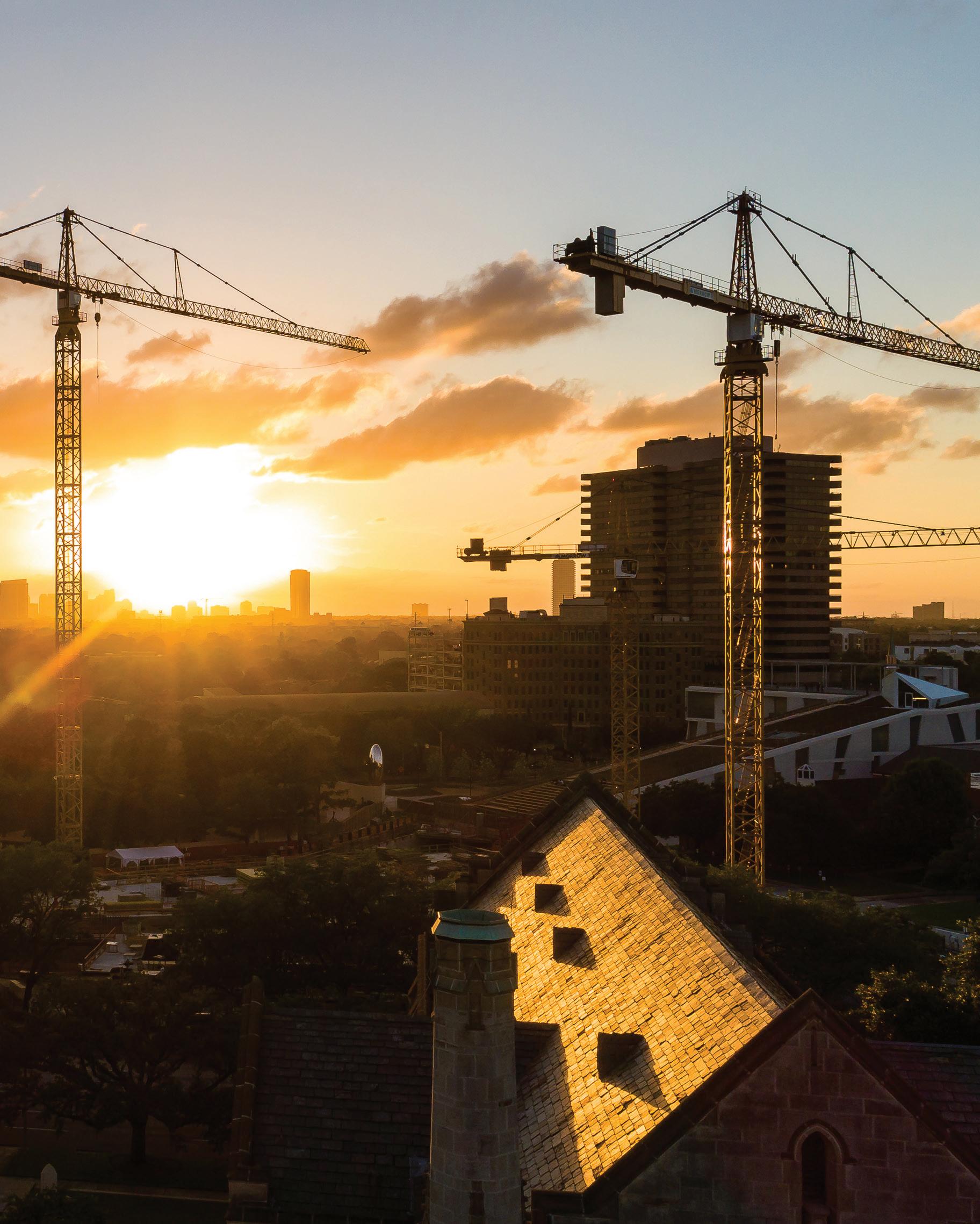
Museum District
Fast-paced development contuines in the city’s cultural centers, and across the region.
Whether by land, air or sea, Houston o ff ers an impressive array of logistical and distribution channels that businesses count on to meet the demands of today’s fast-paced marketplace. With a location that’s equidistant from the East and West coasts, and just hours by air from any metro area in the country, Houston is an ideal hub for companies that need national distribution for their products. Companies that locate in Houston can reach nearly 50% of the U.S. population within a 1,000-mile radius.
The Houston Airport System ranks as one of the largest multi-airport systems in North America. The system is comprised of George Bush Intercontinental Airport (IAH), William P. Hobby Airport (HOU) and Ellington Airport (EFD). Scheduled and charter passenger carriers fly directly to approximately 180+ domestic and international destinations from Houston.
As one of the nation’s busiest rail centers, the Houston region has three class-one railways with a rail network of more than 800 miles of track. Fourteen mainline tracks radiate from Houston and approximately 2,200 trains per week travel within the Houston region’s rail network. The widespread coverage of BNSF, KCS and Union Pacific and others connects Houston with all major markets across the county.
Houston was the top U.S. metro exporter in 2019 by weight, and is home to a number of ports, including the ports of Houston, Galveston, Freeport and Texas City.
The Port of Houston is the numberone port in the U.S. in terms of foreign waterborne tonnage, and the numberone break bulk port in America. An environmental and security leader, Port Houston was the first U.S. port to achieve both ISO14001 and ISO28000 certifications. Port Houston is the largest container port on the Gulf Coast, handling 69% of Gulf Coast container traffic in 2018 and ranked the sixth largest U.S. container port by total TEUs in 2018. The region’s ports are investing heavily to increase container and breakbulk cargo capacity.
3 destinations
2 destinations MEXICO
5 destinations
22 destinations
122 destinations
10 destinations SOUTH AMERICA
7 destinations

Houston’s extensive highway system is well integrated with the Port of Houston, Houston Intercontinental Airport (IAH), Hobby Airport, Ellington Airport, and the mainline railroads serving the city. Houston is at the crossroads of Interstate Highways 10, 45 and 69. When connections are complete, I-69 will link Canada, the U.S. industrial Midwest, Texas and Mexico.
Houston has a “threeloop system,” enabling easy connections across the region including Interstate 610, Beltway 8 and Highway 99.

Bay Area Houston Economic Partnership bayareahouston.com
Baytown/West Chambers County Economic Development Foundation baytownedf.org
Brookshire Economic Development brookshiretexas.org
Conroe Economic Development Council conroeedc.org
CenterPoint Energy centerpointenergy.com
Central Houston, Inc. centralhouston.org
City Development Corporation of El Campo elcampoeco.org
City of Alvin alvin-tx.gov
City of Brenham cityofbrenham.org
City of Cleveland clevelandexas.com
City of Deer Park deerparktx.gov
City of Friendswood ci.friendswood.tx.us
City of Fulshear fulsheartexas.gov
City of Houston Economic Development houstontx.gov
City of Huntsville huntsvilletx.gov
City of Jersey Village jerseyvillagetx.com
City of La Porte laportetx.gov
City of League City leaguecity.com
City of Magnolia cityofmagnolia.com
City of Meadows Place cityofmeadowsplace.org
City of Missouri City missouricitytx.gov
City of Mont Bellevue montbelvieu.net
City of Nassau Bay nassaubay.com
City of Pasadena ci.pasadena.tx.us
City of Richmond richmondtx.gov
City of Rosenberg rosenbergecodev.com
City of Santa Fe ci.santa-fe.tx.us
City of Seabrook seabrooktx.gov
City of Sugar Land sugarlandtx.gov
City of Texas City texascitytx.gov
Cy-Fair Houston Chamber of Commerce cyfairchamber.com
Dayton Community Development Corp. daytontx.com
East End District eastenddistrict.com
East Montgomery County Improvement District emctx.com
Economic Alliance Houston Port Region allianceportregion.com
The Economic Development Alliance for Brazoria County brazoriacountyeda.com
Energy Corridor Management District energycorridor.org
Entergy Texas entergy-texas.com
Freeport Economic Development Corp.
freeport.tx.us
Fort Bend County fortbendcountytx.gov
Galveston Economic Development Partnership gedp.org
Greater Fort Bend Economic Development Council fortbendcounty.org
Greater Houston Partnership Houston.org
Greater Northside Management District greaternorthside.org
Harris County harriscountytx.gov
Houston East End Chamber of Commerce eecoc.org
Houston Intercontinental Chamber of Commerce houstonicc.org
Houston Northwest Chamber of Commerce Houstonnwchamber.org
Houston-Galveston Area Council h-gac.com
Katy Area Economic Development Council katyedc.com
La Marque Economic Development Corporation lmedc.com
Lake Houston Economic Development lakehouston.org
The Lone Star College System lonestar.edu
Matagorda County Economic Development Corp. mcedc.net
North Houston Association north-houston.com
North Houston District northhouston.org
Oak Ridge North Economic Development Corporation oakridgenorthedc.com
Pasadena Economic Development Corp. pasadenaedc.com
Pearland Economic Development Corp. pearlandedc.com
Port Freeport portfreeport.com
Port of Galveston portofgalveston.com
Port Houston porthouston.com
San Jacinto College District sanjac.edu
Sealy Economic Development Corporation sealyedc.com
Tomball Economic Development Corporation tomballtxedc.org
Union Pacific Railroad Company up.com
Uptown Houston District uptown-houston.com
Waller County Economic Development Partnership wallercounty.org
West Houston Association westhouston.org
Westchase District westchasedistrict.com
Wharton County whartonedc.com
The Woodlands Area Economic Development Partnership edpartnership.net

Houston CityBook
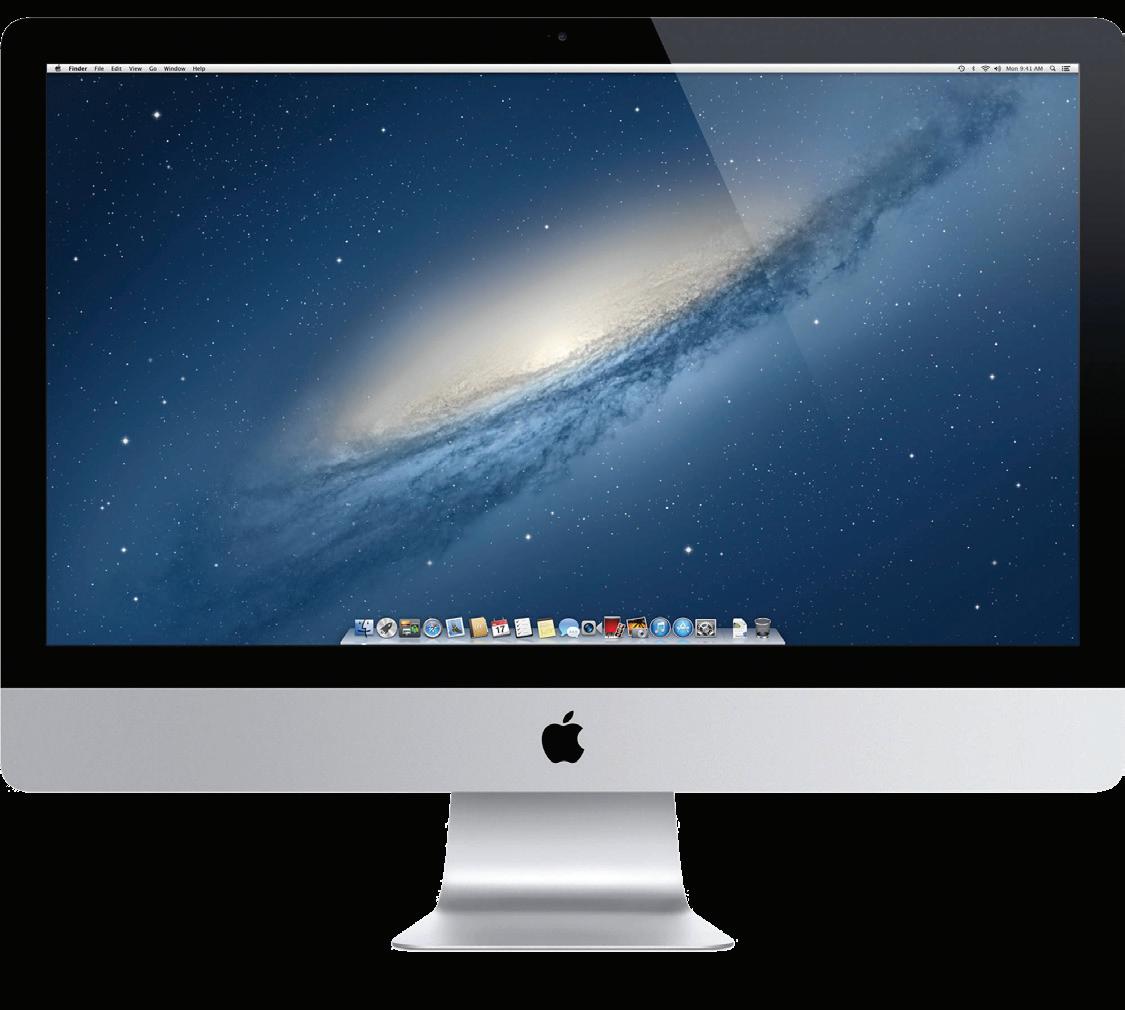
Beautiful lifestyle and culture magazine, proudly and exclusively for Houston


HoustonCityBook.com
The city’s smartest, sexiest and fastestgrowing daily news website

CityBook Digital
Dispatches on arts, dining and much more, in your inbox three times a week

CityBook & Co.
Podcast celebrating icons and upstarts in America’s most fascinating city



CityBook Custom
Distinguished publications created with the region's most prestigious partners


Highly engaging social media, exclusive events for influencers and VIPs, and more!

Pearland is helping change the world through businesses of all sizes.
Pearland works smart for a better world. That’s why we are pro-innovation, pro-breakthrough, and pro-life-changing discoveries in biotech, energy, entreprenuership, manufaturing and a lot more. With a diverse and educated workforce, pro-business culture, expansion assistance, tax incentives, transportation hubs and quality infrastructure, Pearland is all in on innovation. Learn how we do it. Pearland. Because, Innovation Lives Here.
PearlandEDC.com/Innovation


 David Graham, FRANCHICZAR
Joe Miller, KEMLON
Carissa Ball, LONZA
Kelly Mills, SYZYGY PLASMONICS
David Graham, FRANCHICZAR
Joe Miller, KEMLON
Carissa Ball, LONZA
Kelly Mills, SYZYGY PLASMONICS